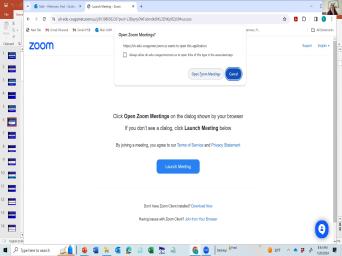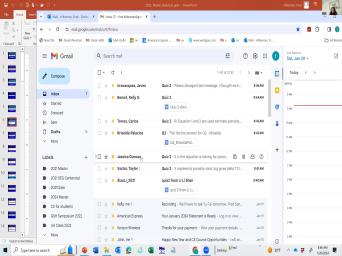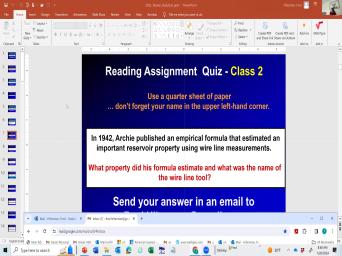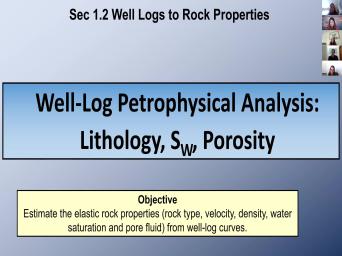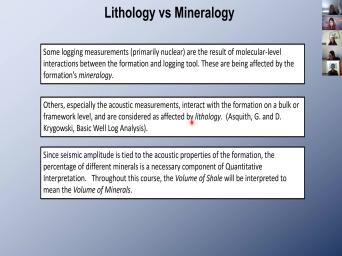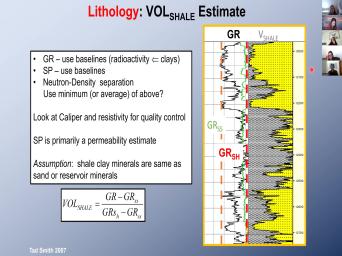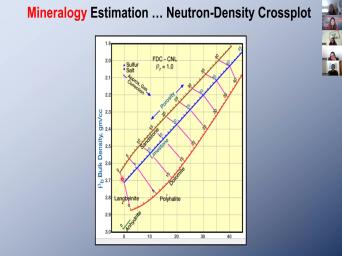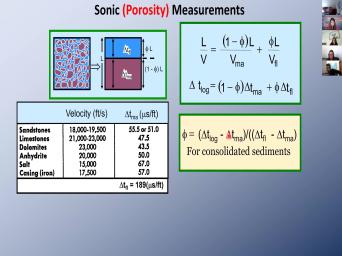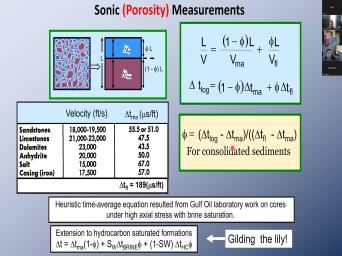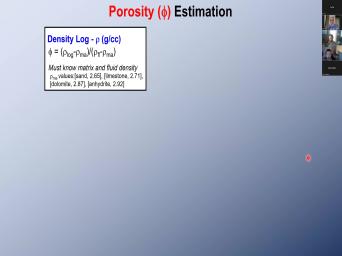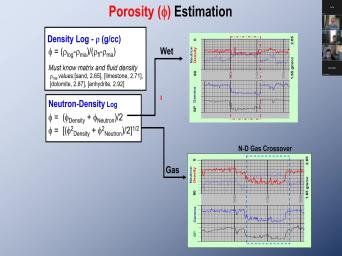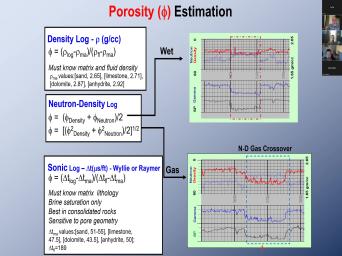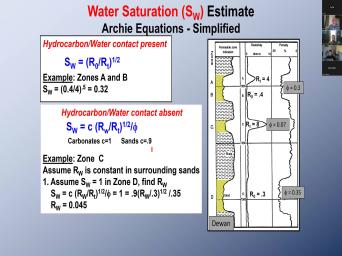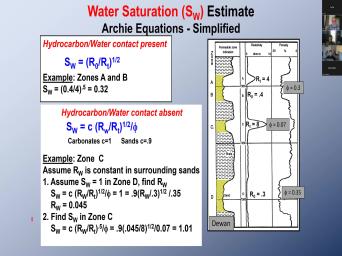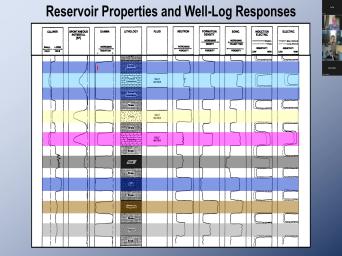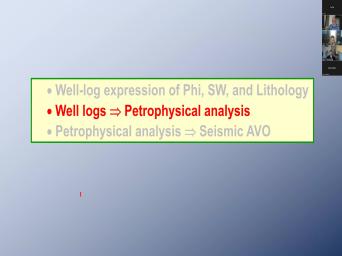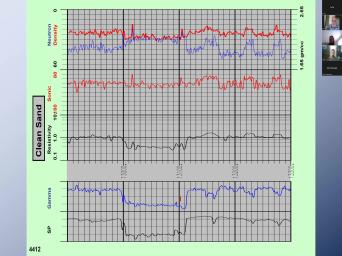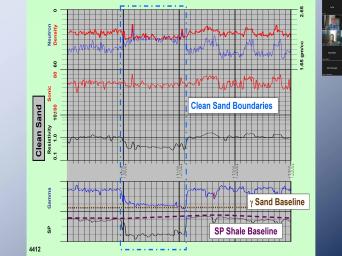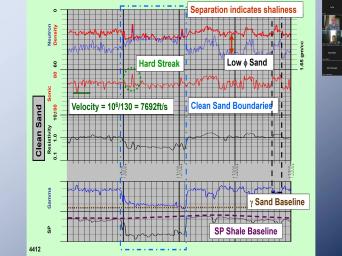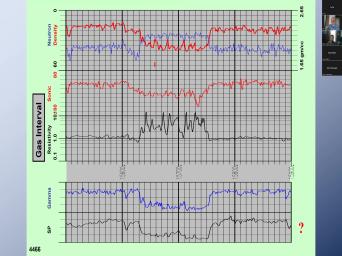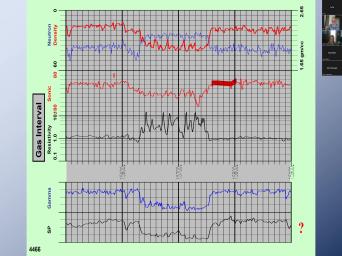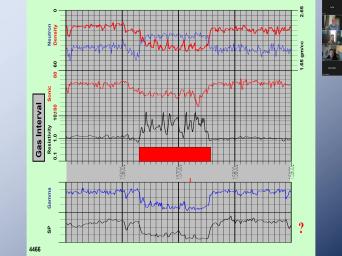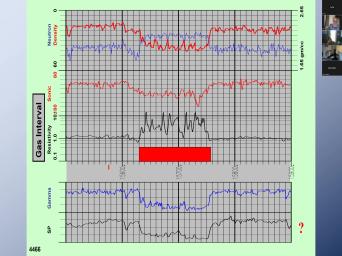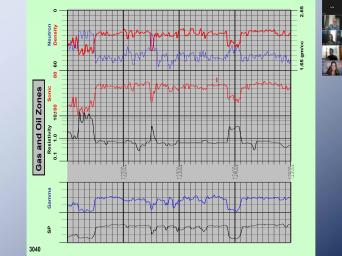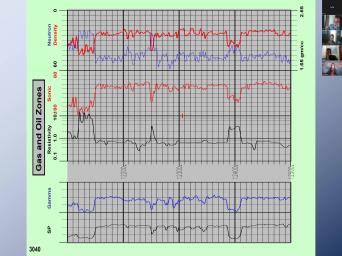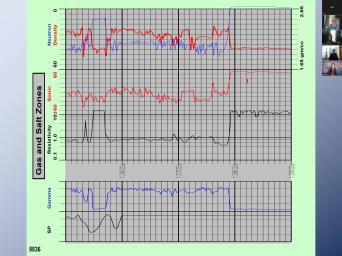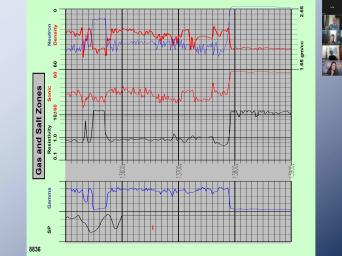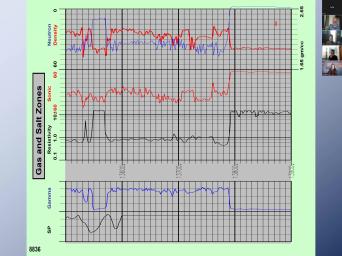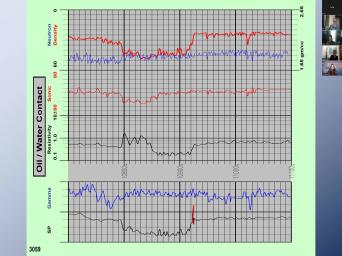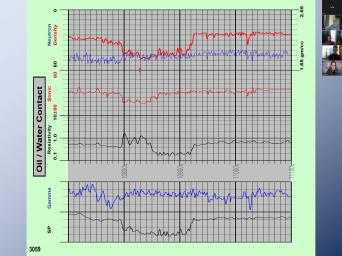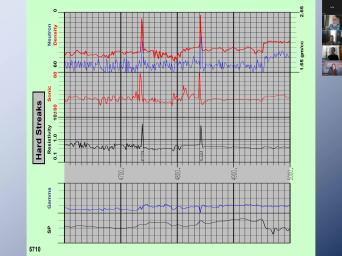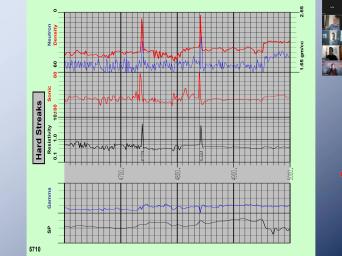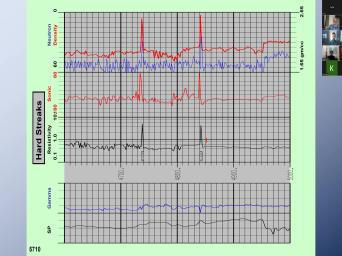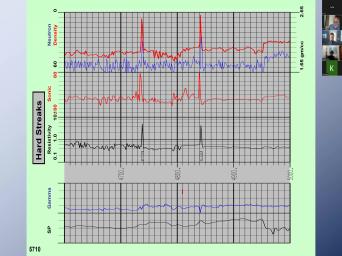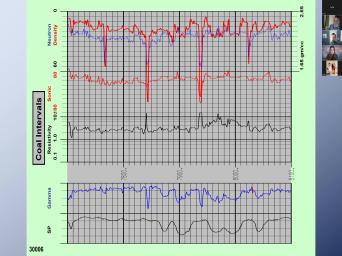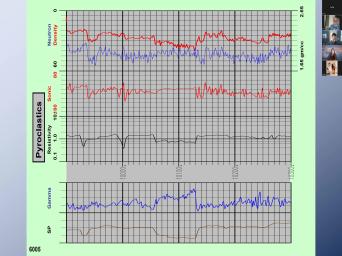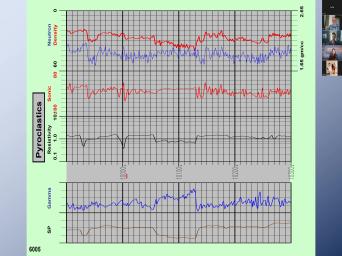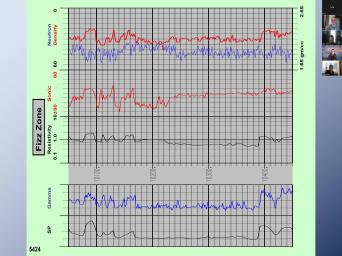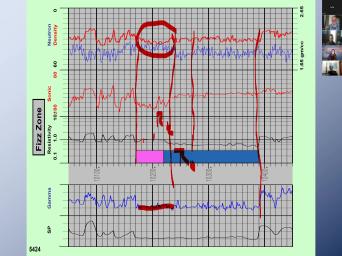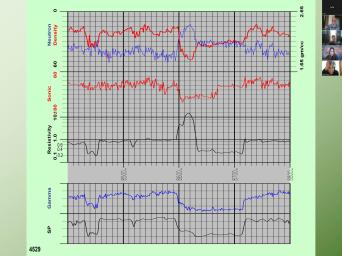| 00:15 | That was perfect. Not now, do I have nine in the class |
|
| 00:46 | ? Yes. No, it's seven 712345670. There's one word. The |
|
| 02:12 | is one word. So all you to write on your piece of paper |
|
| 02:15 | one word that's equals one word. probably asking, Fred is one word |
|
| 02:54 | . Ok. Do I have your ? Uh I'm looking to see if |
|
| 03:02 | folks overseas there and I only see people that are with me overseas. |
|
| 03:12 | Carlos, are you here? O are you here, Jovi is here |
|
| 03:19 | Carlos are you here, Tessa? you here? I can't see your |
|
| 03:23 | faces. Uh No, I uh , one second. Uh I think |
|
| 03:29 | can see me professor. I see now. Is Tessa here. |
|
| 03:35 | one second. She has one Fred. We can't see your pretty |
|
| 03:41 | either. There's a big reason. oh I was eating my kolache. |
|
| 03:50 | enough. Ok. Now that I your attention, everybody's listening to |
|
| 03:58 | Three extra points. All books please. All notes closed. Are |
|
| 04:05 | ready? Three extra bonus points. the equation for how amplitude versus reflection |
|
| 04:16 | versus incident angle. What is that short intuitive equation? Very short. |
|
| 04:26 | consists of two reflectivity, that's And those two reflectivity plus a little |
|
| 04:36 | I allow you to write down how will vary depending upon incident angle, |
|
| 04:45 | angle that the ray makes go into boundary. So take a little time |
|
| 04:52 | I still can't see your pretty So no explanation of the parts of |
|
| 04:59 | equation. Just the just the no explanation. Just make sure you |
|
| 05:05 | it in English. No Air Chinese symbols that I don't know. |
|
| 05:19 | told you last night that this is be on the quiz. The You're |
|
| 05:24 | , Fred, weren't your dad? we doing both handout? Seven and |
|
| 05:34 | at the same time right now? is for this afternoon. Ok. |
|
| 05:43 | is up folks. I expect to mail from you very shortly like instantly |
|
| 05:50 | here are folks bringing their their please. Do you mind? |
|
| 06:01 | a quarter a sheet of paper. got terrible part. Thank you. |
|
| 06:07 | my grandkids? Do these? Make your name's on. Turn on your |
|
| 06:12 | your camera, turn my camera off the pounds. You we mhm We |
|
| 06:30 | . Oh Here. So your your is on. Oh you could, |
|
| 06:38 | could see my camera. Why didn't tell me? Yeah, we can |
|
| 06:47 | you now pro these people on That's what she thought we today. |
|
| 06:55 | is not mine today. T you three out of three the people. |
|
| 07:04 | you want to be here? Take , take it second half. |
|
| 07:13 | t that's bad news. Second half the football game? Ok. I |
|
| 07:29 | them all here. Let's let me to see how I'm doing on my |
|
| 07:35 | . I'm still working on mine to it to you. Is that |
|
| 07:39 | Yes, it is. No, not anymore. As soon as I |
|
| 07:41 | and see if your name is You're not allowed to send them |
|
| 07:45 | So send me something. Then I'm on it. I'm logging into my |
|
| 07:53 | . That doesn't save me. I need to have this that makes |
|
| 08:02 | six and um who am I Kelly and Tessa? So get it |
|
| 08:09 | there. Kelly. I'm working on . See if you're sitting in the |
|
| 08:15 | , I come down snatch your pen you. Not really. Ok. |
|
| 08:25 | . Get your doughnut, get your . Get ready if you don't eat |
|
| 08:31 | , stuff them in your pant Seriously? You expect me to eat |
|
| 08:35 | stuff and get fatter? Huh? the lights expected where he's CC? |
|
| 09:32 | , we have cream sugar and all stuff to go. Look at. |
|
| 09:47 | the the in box in the back of me fucking me. Mother was |
|
| 09:57 | . Maybe all ST sts. this is supposed to be a first |
|
| 10:03 | . Yeah. Oh well, Thank you. Thank you. You |
|
| 10:25 | the tip that was on TV. night they were asking us questions. |
|
| 10:36 | you tip an airline's order? Order you get off the plane? |
|
| 10:46 | so wait, what next thing they're ask us? Change your kids a |
|
| 10:53 | sale version after you buy an That's not ok. Ok. |
|
| 11:30 | That means I have everybody. are you Tessa? Are you |
|
| 11:40 | Yes, you're Tessa, You did take the degrees. What? |
|
| 11:57 | Because you're on the phone. I, I have a fan right |
|
| 12:04 | me and I have bad hearing. on the phone with your mom. |
|
| 12:09 | she help you with the quiz? you should be on the phone with |
|
| 12:12 | mom. What? Ah, that's never heard that one before. |
|
| 12:22 | . What's your name? Newton? , it doesn't work. I'm |
|
| 12:33 | Ok, Tessa, you're not, not there. I can't hear |
|
| 12:40 | All right. Uh, what's the ? Folks? X is equal to |
|
| 12:46 | ? Boy? Nobody knows what X equal to ferocity, ferocity or, |
|
| 12:55 | dance shoes. Let's do words. it must be porosity. Never heard |
|
| 13:05 | before. He took the course for . He had that. I know |
|
| 13:14 | did. What? Ok. Any for Renee audience of participation? Any |
|
| 13:33 | ? There's Tesla. How come you been answering me? Tesla? Your |
|
| 13:36 | on off? I don't think you hear me. I can't hear |
|
| 13:43 | You have to speak up. Are talking, your lips aren't moving. |
|
| 13:51 | , your mic is working, I can hear you. I cannot |
|
| 13:57 | you. Is, can anybody else ? Yeah, I, I can |
|
| 14:06 | you on my end. Yes, can hear Tessa. You can |
|
| 14:16 | Well, the speaker volume increase. up at the top highest I can |
|
| 14:24 | . Others can hear. Oh, about this speaker? Speaker? Am |
|
| 14:31 | on the wrong one? But you hear others? OK. Yes. |
|
| 14:34 | something over there. Just say Yeah. Can you hear me? |
|
| 14:40 | . OK. OK. Maybe she to speak louder. Maybe she could |
|
| 14:45 | that everybody else can hear her except . Yes, sir. I think |
|
| 14:51 | has a directional voice. It doesn't north. She smells. How |
|
| 14:59 | how do you interpret a smile? . Yes, happy. No. |
|
| 15:05 | . Well, folks, let's get with the day's exercise. I don't |
|
| 15:11 | anything from her. This is open . OK. Geophysical, the petro |
|
| 16:03 | analysis. What do we want to out of it? As we said |
|
| 16:08 | , we wanna tell the boss, much is this gonna be worth? |
|
| 16:12 | basically the boss is saying, give the quantitative analysis and the quantitative |
|
| 16:18 | You gotta tell them what the volume of the reservoir, but then you |
|
| 16:22 | tell them what's inside and by telling what's inside in order to get a |
|
| 16:27 | I gave you the equation and what's in number is lithology, sw water |
|
| 16:35 | . Of all the poor volume. much is water? If that water |
|
| 16:40 | is equal to one, that means volumes all filled of the pores, |
|
| 16:47 | filled with water. If it's 0.3 good number. That means 30% of |
|
| 16:53 | , the volume of the pores is with water. 70% some type of |
|
| 16:58 | or sometimes a hydrate, frozen frozen, uh hy hydrate, frozen |
|
| 17:06 | Gas. Hey, OK. Let's at the well log expression for P |
|
| 17:17 | porosity, water saturation pathology. This a typical plot that you will get |
|
| 17:24 | of the well logged modeler. And fact is you have this well log |
|
| 17:30 | you can go ahead and bring it and get a display like this fairly |
|
| 17:36 | . You can see it has a that goes into a P wave velocity |
|
| 17:41 | to the above and always look for times how much times 10 to the |
|
| 17:46 | . So that's 21,000. And let get a pointer 8013 and the density |
|
| 17:56 | neutron porosity, they're plotted backwards with higher value on the left and the |
|
| 18:02 | on the right indicating where the density curve crosses over the red curve. |
|
| 18:12 | an indication of the high potential of gas. And that pours, we |
|
| 18:16 | see that a little later. Then gamma and some of the other curve |
|
| 18:21 | look at each one of those. again, our goal is give me |
|
| 18:26 | , water saturation and mythology. When look at those three properties, once |
|
| 18:34 | , we're gonna do a petro phys from the logs. What's your goal |
|
| 18:40 | to take the seismic data and do petro physicals analysis? And that's our |
|
| 18:46 | . But we like to go frontwards . An interesting definition of mythology that |
|
| 18:53 | found in a geological dictionary. Mythology a study of the rock structure, |
|
| 19:02 | , texture and color using a hand . Now, that might sound weird |
|
| 19:08 | it, when I went to that's what the professors wanted to hear |
|
| 19:13 | . This is what mythology. it's limestone, that's not mythology. |
|
| 19:17 | gotta tell me what the grains look . How do you know just looking |
|
| 19:23 | that? That that was a You didn't drop any acid on it |
|
| 19:27 | ? Can you tell just by looking the grain that there is a |
|
| 19:30 | a calcite grain? So very Uh And that, that's kind of |
|
| 19:36 | . It says don't put an interpretation if you're not sure. And lithology |
|
| 19:48 | mineralogy. Some logging measurements, primarily are the result of molecular level interactions |
|
| 19:58 | the formation and the logging tool. are being affected by the formations |
|
| 20:05 | A good example is the gamma, radiation is affecting what with the |
|
| 20:12 | Others especially acoustic measurements interact with the on the bulk framework. They are |
|
| 20:21 | , they are considered to be affected lithology. Things such as the amount |
|
| 20:31 | compaction in the raw. That is a lithology yet. That's very important |
|
| 20:39 | going ahead and telling you what the velocity is gonna be in unconsolidated |
|
| 20:47 | What's an unconsolidated rock? Give me example. Where would I find |
|
| 20:53 | Where did I find in like consolidated ? Where good fan shallow? |
|
| 21:05 | How shallow? 10,000 ft? In the tertiary officer in Mississippi, |
|
| 21:12 | mean, Officer of Louisiana, Officer Texas, mainly Officer of Louisiana. |
|
| 21:16 | get down 10 11,000 ft. It's unconsolidated and it's not an overpressure |
|
| 21:23 | Yeah, that's gonna be an important . So it's when do we get |
|
| 21:29 | pressure and when has some type of occurred? But remember after Louisiana 10,000 |
|
| 21:40 | , you're just beginning to get into Miocene. So your rocks aren't that |
|
| 21:45 | ? They haven't had die genetic changes much. It's just compassion. And |
|
| 21:52 | the rock is unconsolidated, its velocity normally a function of depth, the |
|
| 22:01 | of forward pressure that you have on and you can do that worldwide bas |
|
| 22:07 | . As long as it's yellow no di genetic changes. Seismic amplitude |
|
| 22:14 | tied to the acoustic properties of the . The percentage of different minerals is |
|
| 22:19 | necessary component of quantitative interpretation. This going to be kind of interesting because |
|
| 22:28 | a sandstone? Is it Ryan? . What's his an though? You |
|
| 22:36 | ? Are you a geologist? no. OK. That's OK. |
|
| 22:44 | him. What does she do. can't hear anybody here. Anybody from |
|
| 22:53 | wanna give me an idea. What a sandstone? Wow, this is |
|
| 23:01 | . Nobody took mineralogy. Oh, not mineralogy. That's physical geology. |
|
| 23:05 | . Oh, I'm sorry. Nobody remember from physical joy. What's a |
|
| 23:12 | ? It's what? That, that's , that's what I wanted to |
|
| 23:18 | It's not quartz gray that it doesn't a sandstone. What defines a |
|
| 23:25 | the grain size so you can have filling up and that happens to be |
|
| 23:33 | park car wreck. They all constitute sense though. If it is the |
|
| 23:39 | green size, I forget what it a millimeter or less, something like |
|
| 23:43 | . That's very important because in quantitative , what does that mean? You |
|
| 23:51 | to make interpretation of amplitude and in to do that, you have to |
|
| 24:00 | , what is the grain inside a ? Sandstone is not good enough. |
|
| 24:06 | everybody assumes its quarts. So what have to do is if you think |
|
| 24:10 | sandstone, something else, you gotta that when you go into interpretation, |
|
| 24:16 | amplitude variation with offset, very Now, we'll see that again and |
|
| 24:23 | . But while we're at this it's a good time. Just to |
|
| 24:26 | it, let's take a look at gamma. The gamma is I said |
|
| 24:36 | lithology, I just went back on word. But usually this is what |
|
| 24:41 | say about lithology. And for the first thing is what's the boy |
|
| 24:47 | , we have a gamma curve. gamma curve is a function of how |
|
| 24:51 | native native uh radiation is within the . What mineral gives the high |
|
| 25:03 | Potassium? What? Potassium? Uranium thorium. What size of a walker |
|
| 25:11 | they big? Small? They're don't they? Most of your |
|
| 25:17 | high radio activity comes from what we , shall clay content in there |
|
| 25:23 | OK. If I say silk, that a shell? Yeah, |
|
| 25:34 | So what is silk? It's not clay. No, it, it |
|
| 25:40 | be a worse. But once silt is a slice. So the |
|
| 25:48 | is based on radioactivity in a, a rock and that's normally the shield |
|
| 25:56 | . Now, there's another line that drawn here and I'm gonna call it |
|
| 25:59 | base line. That's the gamma We say the sandstone. Why did |
|
| 26:03 | say sandstone? Because I grew up Texas as far as exploration is |
|
| 26:09 | That's what normally we have here. don't have a lot of limestone. |
|
| 26:14 | this baseline that I said is a is really every other mineral. |
|
| 26:24 | what I'm saying? OK. that's, that's right. Find |
|
| 26:35 | But what's the minerals in that grade ? Normally you say silt stone is |
|
| 26:42 | uh silt is contained quartz in That's your two. What comes to |
|
| 26:49 | mind immediately? And the thing is quartz could be c like too. |
|
| 27:00 | what is that? So, I , some of our, our unconventional |
|
| 27:09 | are actually house like silk that you're drilling into and trying to frack. |
|
| 27:18 | when you're looking at, at unconventional , you need to know also how |
|
| 27:25 | clay is in there. If your composed of too much clay, you |
|
| 27:31 | try to blow it apart, but not gonna get anything. Just |
|
| 27:36 | go right back. I don't know to do if you have more than |
|
| 27:40 | clay and unconventional reservoirs. I'm guessing , that I'm not an expert, |
|
| 27:46 | gonna be hard to produce that. , that does that give you an |
|
| 27:51 | ? OK. Oops. So this could be the baseline for limestone, |
|
| 28:03 | . But what you're really saying is are the clean, that means this |
|
| 28:10 | a clean sandstone. This is a sandstone down here. You could have |
|
| 28:16 | limestone down here too if it doesn't any clay content in it. |
|
| 28:24 | Salt also would be down here. , there's another curve you could put |
|
| 28:31 | there. The sp and ESP as primary, the physicist primary an indicator |
|
| 28:40 | the permeability because the sp sets up eddy current. We'll see that in |
|
| 28:45 | second. The assumption shall clay, are the same as sand or reservoir |
|
| 28:54 | as far as the strength of the itself. When we talk about quartz |
|
| 29:04 | versus limestone calcite. And we're trying make a prediction on what the acoustic |
|
| 29:15 | would be. We ne never comes what's the size of the grains it |
|
| 29:19 | up as, what is the strength each one of those grade? The |
|
| 29:25 | modulus. How easy is it to a quartz grade? Versus a limestone |
|
| 29:30 | ? Which one of those is the or harder rock? Is it harder |
|
| 29:35 | squeeze a limestone or is it harder squeeze a quartz? It's limestone. |
|
| 29:41 | harder to. Yeah. Limestone the grain itself. Cal has a |
|
| 29:46 | of 71 compared to 32. that's giga pascal going it down. |
|
| 29:54 | pascal amazement. But we have, , we'll get those always a mean |
|
| 30:03 | doing evaluation of the mineralogy. Besides show volume curve is to cross plot |
|
| 30:11 | neutron density. And whenever you have neutron density that where you have those |
|
| 30:17 | the axis, you have to have overlay and the overlay is a normalized |
|
| 30:24 | like conventional I should say. And , it, it's a function of |
|
| 30:28 | porosity and also the different sand Is it sandstone, limestone do of |
|
| 30:34 | sandstone here has to be quartz and upon where your points fall, that |
|
| 30:42 | you another indication of, is it in the limestone? Your points all |
|
| 30:46 | right here with you cross butt B density versus neutron density. It |
|
| 30:52 | right in here. It tells you somewhere between the limestone and the golden |
|
| 30:56 | and it has a certain porosity in . One, if you're dealing |
|
| 31:05 | hey, the vapor type of an . Something you pray for is you |
|
| 31:12 | a photo electric curve to tell you the mineralogy is to help you distinguish |
|
| 31:19 | from dolomite, to distinguish it for in hydra. Otherwise it's pretty |
|
| 31:26 | The reason it's pretty tough is just little change in a li dolomite |
|
| 31:32 | make it look like a limestone. this is a photoelectric curve is one |
|
| 31:37 | hope for very sensitive. And when some areas you're looking for a dole |
|
| 31:46 | . And of course, you're looking a place where the dolomite has come |
|
| 31:51 | leached limestone, limestone that lost or ferocity by some of it being leached |
|
| 31:57 | disappearing. Oh porosity. But by we did this, the pros is |
|
| 32:08 | poor space over the total volume. have a question on the other side |
|
| 32:17 | the road? No, no OK. Do you have any answers |
|
| 32:23 | I can address a question to? like jeopardy, isn't it? They |
|
| 32:29 | you the answer and you have to the question. OK. Here it |
|
| 32:37 | if you want to know what the is, if you have a density |
|
| 32:42 | , you have the density of the component, the density that the log |
|
| 32:52 | the density of the mineral and the the fluid. So when you're looking |
|
| 32:56 | porosity, what do we have? , we have a density bulk. |
|
| 33:00 | we have this value right here. grass for CC oh What's this? |
|
| 33:07 | , you gotta know what rock you're . So you might have to |
|
| 33:12 | well, that is uh pure So this is 2.65 g per cc |
|
| 33:20 | the density of the fluid. Most put something like 1.09 g per |
|
| 33:28 | And that would give the estimate of process. Now, the ferocity estimate |
|
| 33:38 | right here is of the fluid and can weigh down here. You |
|
| 33:44 | oh, if you have hydrocarbons, have to have one minus the amount |
|
| 33:50 | water. So one minus the amount water. That's the amount of |
|
| 33:54 | And what is the density of What's the value of density of |
|
| 34:00 | If you're at 10,000 ft, what be the density of gas? |
|
| 34:09 | Ok. About 0.7. If you're 2000 ft depth, what's the density |
|
| 34:14 | gas? Well, it's 10,000 You're at 0.7 Gras per CC. |
|
| 34:20 | 2000. You'd be about 0.2 0.2 for CC. Oh, it gets |
|
| 34:29 | light as you get up shallow. , that's interesting. And we'll see |
|
| 34:36 | that does to our P wave Ok. Ah, another equation, |
|
| 34:48 | the ferocity again this time. Instead having the density log, it's the |
|
| 34:57 | travel time. Let's put it in . And what is a typical Sonic |
|
| 35:04 | ? Anybody ever hear the Sonic Yes. What's displayed on the Sonic |
|
| 35:14 | ? Travel time? Yes, she have, I don't have a log |
|
| 35:22 | that. So the Sonic log measures amount of time it takes to travel |
|
| 35:31 | ft. So how do you get ? What's a typical value of velocity |
|
| 35:43 | sandstone? So you're gonna a what do you think a typical velocity |
|
| 35:48 | be 2000 ft per second? 22,000 per second? What's a typical value |
|
| 35:59 | the velocity in a sandstone? Anybody overseas want to join in here? |
|
| 36:08 | ft per second. I had a Yeah, a little bit too |
|
| 36:16 | You look at what the slide Not from where you sit. It's |
|
| 36:22 | , I'm looking at the slide. says the velocity is 18 to 19.5000 |
|
| 36:28 | per second. That is if there's porosity thing, that's a grain |
|
| 36:35 | I'm I'm looking for a velocity that that might have 20% porosity in |
|
| 36:42 | Now, if you had zero your answer is, is good 19,000 |
|
| 36:48 | per second, but I don't care those rocks. I'm not building uh |
|
| 36:53 | type of a house that I need quarry the stone. For what |
|
| 36:58 | It's a little porous. 15,000 Percent 15 is a bit high |
|
| 37:04 | You're gonna have a low porosity. , well, now we're getting down |
|
| 37:09 | the areas that we like 12,000 ft second. That's a fast velocity. |
|
| 37:15 | a solid sandstone, unconsolidated 17,000 ft second. So anything below 9000 ft |
|
| 37:24 | second? I would consider that a to be unconsolidated. 12,000 starting to |
|
| 37:31 | consolidative. You're looking at the Maya at about 8 10,000 ft in the |
|
| 37:36 | of Mexico. OK. Let's take ft per second. I like that |
|
| 37:42 | . If the velocity is 10,000 ft second and you run a Sonic log |
|
| 37:47 | it, what would be the delta that you get? What would the |
|
| 37:55 | pt be micro? So many microseconds foot, anybody wanna guess? 10,000 |
|
| 38:06 | per second translates into what delta well, how do I get dealt |
|
| 38:11 | it? Well, we go back the notes that Mike gave you. |
|
| 38:15 | the number million? OK. I microseconds micro means million. So take |
|
| 38:23 | million and divide the velocity into it gives you 100 microseconds per foot. |
|
| 38:32 | , what if I have microseconds per ? The one velocity? Remember the |
|
| 38:36 | million, you take a million and divide the sonic time into that? |
|
| 38:41 | million divided by 100 is 10,000 ft second. Just remember the number of |
|
| 38:48 | . I'm a million dollar baby. what that thing. OK. These |
|
| 39:01 | nice values that we got here and is a nice equation except for one |
|
| 39:11 | , it's really for consolidated settlements when in unconsolidated sediments such as around the |
|
| 39:18 | area, Louisiana up shallow. There's fudge factor. A correction factor. |
|
| 39:26 | they apply and it's purely heuristic and changes wherever you are. It's one |
|
| 39:34 | has to be adjusted normally. Here's they say. If you shall, |
|
| 39:42 | is greater than 10,000 ft per That means if your sonic value is |
|
| 39:49 | than 100 microseconds per foot, think applying an adjustment factor to the porosity |
|
| 39:58 | gonna get because you're gonna overestimate Hey, quick, quick question. |
|
| 40:10 | I'm a little, can you go that last slide? A little |
|
| 40:15 | Like if you look at sandstone, says 37,000, uh 500. But |
|
| 40:21 | when they convert to delta T and per foot, they're not just dividing |
|
| 40:28 | by a million. Um I didn't understand you're, what can you tell |
|
| 40:45 | the operation you're doing? Oh, thought you said if you want to |
|
| 40:49 | from velocity to delta T you could divide it by a million. |
|
| 40:54 | No, you, you divide it a million. You take the value |
|
| 40:59 | have and divide it into a Millions of numerator. OK. |
|
| 41:08 | Let's see. I, we, , we do a break, aren't |
|
| 41:12 | ? People here in Houston are just at all the doughnuts and their tongues |
|
| 41:17 | hanging out. So I better let go ahead and get a doughnut. |
|
| 41:22 | take about five minutes and I, have, I am the big hands |
|
| 41:28 | three and the little hands on So let's come back in about five |
|
| 41:34 | 20 after nine. Please eat those . And that folks, if I |
|
| 41:51 | more than two, I take 10 off your grade, you better make |
|
| 41:55 | disappear. You'll be watching the Texans today. Oh, of course. |
|
| 42:05 | why we have two TV. S . Yeah, I, I wish |
|
| 42:12 | could. I hope it's exciting. let you know how it goes. |
|
| 42:18 | keep you updated. They looked great game. I same as last |
|
| 42:33 | I said they looked great last Yeah. Yeah, way better than |
|
| 42:40 | Steelers. Yeah. Each train looked too. Oh, yeah, they |
|
| 42:51 | scary. That's, that's my daughter's there while she was there. She's |
|
| 42:55 | in Tampa in Tampa now. well, I'm going off to get |
|
| 43:03 | dough and I hope it doesn't drip over me. Did you eat your |
|
| 43:23 | now? Oh, man. Look that. It even had a little |
|
| 43:31 | chicken that you think? Ok, can do that. I know the |
|
| 43:41 | who don't just like mommy used to . Mhm. Yeah, you |
|
| 44:38 | How do I get my face off here? All right. Thank |
|
| 44:45 | Move to below. Let me, , here on here. So, |
|
| 44:52 | , videos. Anybody have any good . T three T play at |
|
| 45:56 | 3 33 15 or 330. I know. Maybe the broadcast starts at |
|
| 46:08 | and that's being played in where Indianapolis was it Baltimore is this app, |
|
| 46:20 | ? Is that a closed stadium or ? So there could be snow up |
|
| 46:26 | in 2000. We had all the . I lived in Denver for a |
|
| 46:44 | time but I'm not very particular Broncos or. All right. My last |
|
| 46:53 | with the Houston Rollers. Yeah. wife's name still here. And |
|
| 46:58 | because I knew people on the they didn't have this trading every six |
|
| 47:04 | and they didn't have the s so salaries that the public still got |
|
| 47:13 | They liked them. Uh, and knew everybody's name on there. So |
|
| 47:19 | can go from one season to the . I don't know what Billy Whitechurch |
|
| 47:22 | gonna do that. That's Dallas. is this? Your husband? |
|
| 48:03 | here's a tattoo. What was Did your, did your husband |
|
| 48:29 | Like the what I amaze, I used to visit Brazil a lot |
|
| 48:42 | as if I'm traveling to the these kids, all of them have |
|
| 48:46 | soccer ball that they're kicking on their to school at night time. 11 |
|
| 48:52 | at night. That's the time when older gentlemen get the soccer field. |
|
| 48:58 | talking about the guys that are in fifties. 60 years old, forties |
|
| 49:02 | still pretty active. Fifties start to down quite a bit and when they |
|
| 49:06 | playing their soccer, it could you can see why the crowds are |
|
| 49:12 | big. Like a hand that I by the, that's fine. Thank |
|
| 49:38 | . Yeah, like a like a OK. Can you hear me |
|
| 49:50 | Oh God. Can you shake your and if you hear me and can |
|
| 50:02 | see us? OK? Are there questions that somebody might have here in |
|
| 50:15 | audience? The audience abroad? For our estimation, now we're gonna |
|
| 50:32 | two logs and now is a good to uh kind of look at what |
|
| 50:39 | can get out of these two I I it's sort of an important |
|
| 50:44 | . You display the neutron and the log on the same track, the |
|
| 50:50 | scale also. And the upper one here as you're looking at it, |
|
| 50:59 | red density lou neutron down below are gamma and the SB and one of |
|
| 51:08 | things you want to do at first kind of ask the questions are, |
|
| 51:17 | I believe the logs that I'm looking ? Are they good? Maybe one's |
|
| 51:23 | ? Well, the first thing you is you look down at the logs |
|
| 51:26 | the bottom and you ask, do logs change very important, do the |
|
| 51:34 | change as we go from one curve the next here? Definitely I have |
|
| 51:40 | change in the gamma, but the has the same change lo and |
|
| 51:47 | so does the neutron and the density a, a change there? And |
|
| 51:53 | look at the top and yes, , now I know the bottom down |
|
| 52:00 | would be the clean curve would be curve for clean rocks. And I'm |
|
| 52:06 | a sandstone environment. And so I this most likely is a clean |
|
| 52:12 | meaning clean sandstone. And the SP shows the same. Now, a |
|
| 52:18 | of folks say SP is just for . But the SP also in the |
|
| 52:25 | coast is a great correlator going from world to the other saying this is |
|
| 52:30 | Wilcox, this is the Wilcox, tends to be very stable. And |
|
| 52:36 | they touch, I call this, the two curves are kissing right |
|
| 52:42 | that means it has very little clay it. It's a clean sandstone. |
|
| 52:49 | right in here as the separation of neutron and the density gets bigger. |
|
| 52:56 | having more clay content introduced in When they kiss like this, the |
|
| 53:06 | density logs say use it this way estimate the pros take the density |
|
| 53:13 | take the neutron value the same you're and divide by two. That's if |
|
| 53:21 | are water wet. OK. If have hydro carbs, something very spectacular |
|
| 53:29 | . He says, yes, yes. You clap your hands the |
|
| 53:33 | and the blue cross over. It's gas crossover effect. When whenever you |
|
| 53:43 | gas and you have the density lo asking what does the density log really |
|
| 53:51 | ? What is it measuring? it's measuring the total density of the |
|
| 53:59 | . Well, look at the porosity here, the porosity it says that |
|
| 54:04 | is down like 40% porosity. And other one says now up here, |
|
| 54:09 | know, it's more like 30% the measures the total density, but that's |
|
| 54:18 | porosity. In order to get you need to go ahead and use |
|
| 54:24 | equation. And in that equation, must give me, what's the density |
|
| 54:30 | the poor fluid? All the program . When they're logging, they just |
|
| 54:35 | it in the computer. The density water is 1.09 CC. It's set |
|
| 54:41 | because it's set at that high it predicts too big of a |
|
| 54:48 | So that ferocity right here, that's big is because the fluid density in |
|
| 54:53 | computer where they log this is set . It doesn't, doesn't have the |
|
| 54:58 | density of the fluid, but that's indicator of hydrocode. Meanwhile, the |
|
| 55:07 | for the neutron, it says it's small. Well, how does the |
|
| 55:17 | as the neutron work? It? it estimates what it, it, |
|
| 55:24 | estimates the amount of water that's in pores. And if you have |
|
| 55:29 | it said, oops all of a , I don't have much water. |
|
| 55:35 | course, the gas took it So you give a very small |
|
| 55:40 | So the neutron, it gets the dens of dog, it gets |
|
| 55:45 | for predicting they cross over. And is almost always something an individual quickly |
|
| 55:52 | for is that crossover? And you'll it's again a clean sand sitting down |
|
| 55:59 | here when you have the Sonic log you try to use these values. |
|
| 56:13 | it's cross over you, you don't to screw with it. You wanna |
|
| 56:17 | at neutron density or some folks try estimate the actual fluid density. The |
|
| 56:28 | is for high velocity rocks. They ferocity up in Alaska and uh very |
|
| 56:38 | formations up there using the Sonic glove it doesn't care what's in the |
|
| 56:46 | What? Yeah, on those hard , they don't care what's in the |
|
| 56:52 | . They just care what does the look like. And so up |
|
| 56:57 | very hard rock, it's not going tell you, is it gas or |
|
| 57:01 | or oil? It's gonna be very change in the Sonic reading. It's |
|
| 57:07 | a function of the matrix material, fractures, the processing water saturation. |
|
| 57:18 | you can see down here, this water saturation on the bottom of the |
|
| 57:24 | here. And it says when you're shallow, you might get a water |
|
| 57:31 | of 40 0.4 meaning the amount of that you have is 60% as you |
|
| 57:44 | deeper. Excuse me, I said wrong. Your water saturation is |
|
| 57:51 | Now, I can understand it. the wrong curb is 0.3 as you |
|
| 57:56 | deeper, you tend to get more in your poor space than gas |
|
| 58:06 | Look at it, it starts off at 0.4 at 1000 ft and look |
|
| 58:11 | it decreases because of compaction and Genetic changes on consolidated rock. It's |
|
| 58:20 | compassion resistivity. We are gonna have resistivity experiments today over in the science |
|
| 58:31 | research building one. Anybody, everybody over to science and research building one |
|
| 58:36 | in the basement. Have you ever in the basement? What do you |
|
| 58:44 | down there? 1,000,000 mm. What of, what kind of experiments |
|
| 58:56 | that like fiber optics experiments in the of uh oh I can tell these |
|
| 59:04 | up the secret planes. Anybody uses optics. But in the tank, |
|
| 59:11 | ever go look at the tank, set it up today for us. |
|
| 59:15 | a big water tank there in the . Really big Hilton back in 76 |
|
| 59:21 | we were here and it has two steel plates that a meter by a |
|
| 59:31 | and are separated a meter apart. what we're gonna do is we're gonna |
|
| 59:37 | down there and put a six volt right there. And we're gonna measure |
|
| 59:43 | current. And what we're gonna be to do is since we have the |
|
| 59:49 | and the current, we can determine resistance on what the resistance is to |
|
| 59:57 | electrodes, electrons across from one plate the other. And so we're going |
|
| 60:04 | measure the resistance we want resistivity though , what are the units? The |
|
| 60:15 | or resistance has the units of what right? So many owns resistivity they |
|
| 60:25 | is resistance times the area over the of separation or the area of that |
|
| 60:32 | is one square meter and the separation 1 m. So squared meter over |
|
| 60:39 | m leaves just a meter. So we're gonna read the resistance era, |
|
| 60:46 | really reading the resistivity in Ohm's Ok. Now we're gonna have you |
|
| 60:55 | , break you up into a couple groups. The first thing we're gonna |
|
| 61:00 | is this is pure water. We're try to measure the resistance. You |
|
| 61:08 | , there's no current, current does flow through pure water. Very, |
|
| 61:14 | hard. It has to have some of electrons in there. Some type |
|
| 61:20 | the float some salt. So I'll you some of you some salt bag |
|
| 61:25 | salt, two bags and you throw in there. So now we have |
|
| 61:29 | water and there's a way for the to flow to the other one place |
|
| 61:35 | the other. So that current, you put some salt in it, |
|
| 61:41 | gonna be the resistivity of the formation water. That's what you've just |
|
| 61:49 | Now, two of you are gonna it, be given a shovel and |
|
| 61:53 | dirt in there. And when you the dirt in there, you've cut |
|
| 61:58 | lot of paths for the electricity to . The current lost a lot of |
|
| 62:04 | . So you reduced the amount of the current could flow through, we |
|
| 62:10 | all those. So that means the is gonna be higher. You have |
|
| 62:15 | force energy, more energy in So if the resistance is gonna be |
|
| 62:21 | , when you have rock with the water in it, we call that |
|
| 62:26 | subzero and R subzero has to be than a water resistivity because you've got |
|
| 62:32 | and you're hindering some of the And finally, group eight, you're |
|
| 62:37 | us a couple quarts of oil, gonna drop that into that rock, |
|
| 62:42 | sand we threw in there. And you do that bingo more pours |
|
| 62:49 | are clogged up and electricity doesn't like go through oil. So the resistivity |
|
| 62:56 | up again. So we have three . We worried about resistivity of the |
|
| 63:02 | resistivity of the rock. When it water in it and resistivity, they |
|
| 63:07 | , they call it the true resistant it has rock, water oil. |
|
| 63:15 | the third one. And that is be greater. Oops, that's gonna |
|
| 63:20 | greater than the resistivity of the rock it has its water in. That's |
|
| 63:25 | you need, right? Exam You ready for your exam? |
|
| 63:32 | That means I got your attention. I say exam, everybody's eyes light |
|
| 63:38 | . Oh God, I can't get lower grades. He's already hurt |
|
| 63:42 | You ok, over there folks? , you awake yet? Ok. |
|
| 63:46 | sorry to wake you up. I . I put you over there so |
|
| 63:50 | can see him. What is the of hydrocarbons up here? Why do |
|
| 64:01 | say that, Fred? Because on part here, this is either a |
|
| 64:06 | or an SP curve. And this right here, that would be the |
|
| 64:13 | of a, a clean sand, like that. So thi this looks |
|
| 64:18 | maybe an SP because this down here more deflected than up here. |
|
| 64:26 | and, and when you put hydrocarbons a s, the SP I, |
|
| 64:31 | , it's reduced a little bit because eddy currents that it generates is |
|
| 64:39 | So up here, we see that have oil or something up in the |
|
| 64:44 | portion of this and then you have likely water here. So this would |
|
| 64:52 | the resistivity of the rock when it water in it. It's 0.4. |
|
| 64:57 | is the resistivity of the rock when has water and oil. Now. |
|
| 65:02 | we come over here to a guy the name of Gus Archie from the |
|
| 65:08 | and he says a quick and dirty to get the water saturation is take |
|
| 65:13 | resistivity 0.4. So we take that . Yeah. And put it in |
|
| 65:18 | numerator and you divide by the resistivity the zone you're interested in. And |
|
| 65:23 | answer after you take the square root out to be 0.32. That's a |
|
| 65:30 | so go here. Now that has rock has 70% let's say gas in |
|
| 65:38 | . It doesn't matter if it's gas oil both are gonna give you about |
|
| 65:43 | . OK? Oh He thought that good. Fred. Look at the |
|
| 65:48 | down here. It even had a resistance. That means more oil, |
|
| 65:53 | gas. Ok. Let's go ahead do it. So, let's find |
|
| 65:59 | water saturation for this. That ought be not 0.3. Probably 0.1. |
|
| 66:05 | any water at all. It's, got a problem though. Um, |
|
| 66:12 | the, for this zone here? the resistivity of the rock when it |
|
| 66:18 | has water in it? This sand fully filled with tears. Ah |
|
| 66:25 | you got one just above you. not too far away. So let's |
|
| 66:29 | that for the resistivity of this rock there's water in it. Uh uh |
|
| 66:34 | Stop Fred. Why are you stopping ? Because look at the porosity. |
|
| 66:39 | rock here has a porosity of This rock has a porosity of |
|
| 66:46 | They have different processes just because there's po you're gonna have different resistivity. |
|
| 66:54 | . Ferocity means you don't have as low paths for electricity to go |
|
| 66:59 | So it's native, it's gonna have higher resistivity. In other words, |
|
| 67:08 | is inversely proportional to porosity. You all the pros away your resistance is |
|
| 67:15 | be sky high. I knew we solve this problem, but there's a |
|
| 67:23 | . The solution is we assume all rock down here has the same water |
|
| 67:31 | other ways, the formation of water probably the same for 1000 ft with |
|
| 67:37 | assumption. Oh we go ahead and say, well, let's look at |
|
| 67:41 | . Here, here's a rock. know the processing resistivity 0.3 it doesn't |
|
| 67:50 | like based on this relative change right . It says the CN, the |
|
| 68:00 | has a lower resistivity than a shell it. And that's natural. That's |
|
| 68:09 | . So we go back to Archie say, can you help us? |
|
| 68:12 | said, I, I got another to help you. And this is |
|
| 68:16 | that Mike made me, gave you quizzes on. He s he |
|
| 68:20 | now we're going to take away R . You don't know it. So |
|
| 68:26 | your new equation for water saturation. is a constant. Are you |
|
| 68:32 | It's 0.9. OK. Do you the true resistivity? Oh Yeah. |
|
| 68:40 | here it's gonna be 0.3 down RT and R zero are the |
|
| 68:46 | No, no, no, RT is when you have hydro |
|
| 68:49 | OK. This sand has one drop oil. Is that OK? |
|
| 68:54 | It has hydrocarbons. So RT and zero are about the same uh good |
|
| 68:59 | . So we come down here and take this equation. We say what |
|
| 69:04 | gonna do is I'm gonna use this here. And what I wanna find |
|
| 69:08 | is what's the resistivity of the OK. Let's come down here. |
|
| 69:16 | know the water saturation down in here gonna be one great C is |
|
| 69:25 | The water resistivity. We don't know what we're looking for. How about |
|
| 69:29 | resistivity is true? Well, that's 0.3 that goes over here and then |
|
| 69:35 | divide by the process right here. I have an equation right here that |
|
| 69:43 | is unknown, but it's the only solve for that RW. And you |
|
| 69:49 | 0.0045. Now, what are you do? Well, I'm gonna go |
|
| 69:55 | up to this song right in Insane. No, I know what |
|
| 70:02 | is because it's nearby and a lot use the same formation of water |
|
| 70:08 | I know everything in here except Let's go ahead and put it in |
|
| 70:17 | here. We have the same We know it's 0.9 resistivity of the |
|
| 70:25 | 0.045 from above the sat the rock , the porosity 0.07. So what |
|
| 70:35 | the saturation, water saturation? It's , this rock is filled with water |
|
| 70:46 | the resistivity is twice as high as resistivity that I get up here. |
|
| 70:54 | , this is all water that has lot of gas or oil in |
|
| 70:58 | Why? Because of this value right , you have a very small porosity |
|
| 71:05 | because you have small porosity resistivity goes . So be leery of high resistivity |
|
| 71:12 | sands because it could be just a of porosity. I like this diagram |
|
| 71:24 | . Norm Hine used to be a at Oklahoma. Uh put it up |
|
| 71:30 | it kind of gives you and I it all the time. It gives |
|
| 71:34 | an idea what the curves should look . In other words, what the |
|
| 71:45 | uh rule of thumb would say. the curve. For instance, let's |
|
| 71:51 | at a G gamma curve and the comes down and it says I got |
|
| 71:57 | sandstone right here and it has oil it, in the bot, it |
|
| 72:03 | salt water and there's gas at the . So the gamma shows a nice |
|
| 72:11 | base. Now, meanwhile, the is a little different. Here's its |
|
| 72:19 | , but because it has oil in , it's not gonna have the full |
|
| 72:25 | exchange then gas even less. So kind of negates some of the eddy |
|
| 72:31 | and you don't get the same flat or the SP as we go down |
|
| 72:45 | things such as the limestone, there a very thick limestone. And |
|
| 72:52 | this right here, gamma shows a , no, hi, radioactive |
|
| 73:02 | The SP is not quite as abrupt a sandstone. It kind of smooth |
|
| 73:10 | right there because it has gas. not because it has gas. It |
|
| 73:16 | go down as far in the The one to watch out for who |
|
| 73:24 | , who to watch out for here one we're gonna open up. |
|
| 73:34 | wall curves, the first thing you're do, let's look at the SP |
|
| 73:40 | the Gamma to see. Are there zones of interest? Oh, there's |
|
| 73:45 | zone down there looks like a clean and immediately you rush up at the |
|
| 73:50 | , look at the neutron density, if there's any crossover, big crossover |
|
| 73:57 | . OK. So let's look for crossover and what we're gonna do is |
|
| 74:04 | gonna come down here and you're gonna a salt section. And when you |
|
| 74:13 | into that salt section, the gamma a very thick zone right in |
|
| 74:20 | And I don't have a, the density is going to have a cross |
|
| 74:30 | but you come down to the SP it's flat. It says SP says |
|
| 74:40 | no permeable formation there, even though neutron density has a crossover. |
|
| 74:48 | I'm gonna say that and then the 30 minutes you're gonna be tested on |
|
| 74:54 | as I go through a bunch of and I wanna get you all excited |
|
| 74:58 | all the high grounds we have until in the crowd say, yeah, |
|
| 75:02 | the SB says there's inform. Oh , I won't make it that easy |
|
| 75:09 | you. I'm gonna take the SP . I wanna show that ESB is |
|
| 75:14 | good because it's a flat line. said they edited that. Now, |
|
| 75:19 | don't have an, now you don't an SP and the gamma shows us |
|
| 75:24 | . So what do we do This is exciting. Just like a |
|
| 75:29 | author, wrote, I don't know famous authors. OK. I'll tell |
|
| 75:42 | what this next section have always been . It's so exciting. We have |
|
| 75:49 | give you five minutes to take a break. So we come back into |
|
| 75:52 | . Ok? So let's take a minute. It's about 10 to |
|
| 75:58 | five up and we'll be ready. ? The gamma is assault. |
|
| 76:50 | Again. It's gonna show they a clean formation and I took the |
|
| 77:03 | right? And you got one other do you have, you gotta give |
|
| 77:10 | at a very high degree. so that shows how about then he |
|
| 77:18 | in the sun? Yes, welcome for 3500 the exact value of self |
|
| 77:33 | . So, so do do you a distant but so it shows a |
|
| 77:41 | of salt around 40,500 and the density 2.12. There's no world that I |
|
| 77:54 | it's that why does that matter the of the result? So it's density |
|
| 78:01 | the sonic curve that you look at ? Yeah, but sorry, I |
|
| 78:06 | , I got a little excited. . Don't forget all of the food |
|
| 78:38 | there is still crying with your name it. No, no, |
|
| 78:50 | never want that thought of it. that she does have cheese uh for |
|
| 78:58 | base I mention I see. So do that. That's bad. Oh |
|
| 79:18 | double E changes as you travel changes tend to everything. Yeah. |
|
| 79:26 | you go to uh advise dermatologist, know the same. I always stop |
|
| 79:34 | this. We have to stop all type of the one I could |
|
| 79:45 | The base form out cheese and bacon . 35. So, I, |
|
| 79:55 | don't know why I, I I, I took place, I |
|
| 80:06 | take on the way just to It's no longer but we just, |
|
| 80:24 | chip the relish, chopped onions, . Yeah. Some of the |
|
| 80:33 | I love jalapenos too. They just to talk to me. East |
|
| 80:46 | Now. What Pakistan is that? ? So Bangladesh, what's that? |
|
| 81:06 | , I went to Bangladesh. I it was uh by 1969. That's |
|
| 81:20 | poor country. I it's really They gave a course over there. |
|
| 81:28 | about a week. Thank you. they said that the city of |
|
| 81:34 | the capital only stay at these two , the Continental or the Sheraton. |
|
| 81:40 | you're gonna go out to eat, eat at the Intercontinental sh nowhere else |
|
| 81:47 | the minister's house. A minister of located in the middle of the walk |
|
| 81:53 | block. He has all these homeless around the street which he feeds |
|
| 82:03 | He, he considers them his people so he feed, takes care of |
|
| 82:07 | . Of course, he a multi minister of energy. Say so at |
|
| 82:14 | house and his wife came down for , the grand staircase. It's, |
|
| 82:22 | like one of the movies that uh but what was the, the big |
|
| 82:30 | Gone With the Wind and the Oh, she's stunning. But the |
|
| 82:36 | that she had on. So my , you know, this, but |
|
| 82:40 | thought, you know how wealthy they . So I ate there and the |
|
| 82:47 | of the time I ate the Intercontinental , you know what's coming to |
|
| 82:53 | I come back to Houston. Fly over the weekend. Oh, that |
|
| 82:58 | not a nice trip. I had flight to India. They kicked me |
|
| 83:04 | the plane and I be, ok. Yeah, I, and |
|
| 83:12 | kicked me off the plane, everybody another point was delay. And so |
|
| 83:22 | gave our flight to other people but delay and we had to wait three |
|
| 83:27 | for another plane to fly in um, get out. So I |
|
| 83:32 | to see the you d that was . You know, back back to |
|
| 83:40 | morning reading my newspaper at breakfast and it third page. No, |
|
| 83:47 | no. Do it off the kitchen the Interna International Hotel and do of |
|
| 83:56 | has been closed because they found bones humans remaining in the kitchen. I |
|
| 84:06 | I ever order a variety of dates this or something like that. Oh |
|
| 84:12 | . And I believe it, they us when we first we were |
|
| 84:16 | oh, you can go swimming, go over there, swim pool, |
|
| 84:21 | had flow dead rats and all over place. The entertainment was at seven |
|
| 84:28 | at night or so. They turned music and there was a speaker in |
|
| 84:33 | room that have music. There's no or radio. You, you just |
|
| 84:37 | to say music. They had a display case about 3 ft high, |
|
| 84:44 | ft long where they had various sundry such as shaving lotion and things like |
|
| 84:52 | . You know, packing down, , you know, that, you |
|
| 84:55 | , packing down was like $5 and knows this outlandish prices for anything. |
|
| 85:03 | , but follow him really poor. , my colleague, when I was |
|
| 85:11 | the university, he was a chief for the National Geological Survey. And |
|
| 85:18 | invited the Soho by to visit. think it said and it was |
|
| 85:25 | this dining room has one light bulb down. That was it. And |
|
| 85:31 | had to borrow blades and chairs. said my wife and I did start |
|
| 85:37 | . He must have spent a fortune the one piece of fish that he |
|
| 85:44 | . Oh, never again. folks. Are you ready? |
|
| 85:48 | did you hear my stories? Can see your faces so I can see |
|
| 85:52 | shaking your life, please, Ok, Tessa there. Oh, |
|
| 85:57 | she is. And ho are you ? Procida? Hello, Carlos |
|
| 86:06 | You lose your camera. Ok. , I got, I got |
|
| 86:09 | But you bet. Now here we . I'm gonna hide you for a |
|
| 86:13 | . Folks. Can you see my ? Ok. We want to quantify |
|
| 86:20 | elastic properties, environmental conditions from well . Eventually we want to do seismic |
|
| 86:26 | with or without hydro carbs. We do a sensitivity analysis too which we |
|
| 86:31 | show you. OK. Now, I normally do as I go through |
|
| 86:39 | first one and then can you all this? This is a pointer. |
|
| 86:49 | . It has a little red light the end. I think it |
|
| 86:56 | O don't go through your eye And um I passed this around the |
|
| 87:02 | . 00, this is the first the class heard about that. And |
|
| 87:05 | gonna interpret the next log that I up. Now they're paying attention since |
|
| 87:11 | said they gotta do it. First thing I do, I'm interpreting |
|
| 87:17 | . I come in here and I the SP shell baseline. No, |
|
| 87:23 | shell baseline for the SP is gonna more stable than the shell baseline. |
|
| 87:30 | put one on the gamma because who's say the same amount of radioactivity is |
|
| 87:37 | each shell flow? But on the it's a more stable. So it's |
|
| 87:42 | more of a concentration of the eddy . Then I go to the gamma |
|
| 87:51 | it has a zero baseline also. you see the shell baseline is no |
|
| 87:56 | currents are flowing. So that's a value. And that's pretty much the |
|
| 88:01 | for all the total shell value. , up here, if you have |
|
| 88:07 | radioactive material, you get a flat . So the sandstone value here should |
|
| 88:13 | same as down here where the limestone a flat line. So that gives |
|
| 88:18 | two baselines, but I can extrapolate sp to up upwards here. The |
|
| 88:26 | thing I look for are clean There's a little rule of thumb that |
|
| 88:32 | every curve should change at bed The sonic should change value at the |
|
| 88:39 | boundaries as it goes from shale to to clay to whatever. And so |
|
| 88:44 | look here and I ask, be are very evident on the gamma right |
|
| 88:54 | . The sp re resistivity clean up , they kiss right up here. |
|
| 89:04 | boundaries. Very evident. You got little chilliness right up here. Since |
|
| 89:10 | curves are starting to deviate, I a little heart streak rate in |
|
| 89:17 | But that heart streak I thought first all, what is it? |
|
| 89:21 | it has a high density and it a high resistivity. So I, |
|
| 89:25 | believe it's OK. It's, it's good reading. I come over here |
|
| 89:32 | there is another sand sitting right in and it has a high resistivity. |
|
| 89:38 | Boy potential hydrocarbons because look at the here, but it's water and that's |
|
| 89:44 | higher. That might be hydro But then we go up here and |
|
| 89:48 | uh oh very high density sitting on , meaning low porosity, meaning high |
|
| 89:58 | because the porosity is low in that . So I compare this porosity over |
|
| 90:04 | to one over here. Uh oh why different levels I look at the |
|
| 90:14 | between the density and the and the log and that separation is an indication |
|
| 90:21 | chilliness that we're seeing in there when were trying to read the density |
|
| 90:28 | a lot of times you don't have density plotted here. So I come |
|
| 90:34 | and I see what it is is function of porosity. So I got |
|
| 90:38 | porosity value sitting in here and I density is equal to 2.65 one minus |
|
| 90:46 | pros value that would be the solved . And this right here it, |
|
| 90:52 | computer program uses the value of one the water saturation. And you can |
|
| 90:58 | that in the header value of the . OK? You're up the person |
|
| 91:17 | just pointed to is getting very I help you. Oh OK. |
|
| 91:25 | young here. But I want you go through the same thing. I |
|
| 91:32 | I'll, I'll yell along with OK? You're flipping through your logs |
|
| 91:40 | all of a sudden you stop right , you stop because you saw something |
|
| 91:46 | the SP gamma that wasn't straight Talk to me about that. What |
|
| 91:52 | be the first thing you wanna He says he wants a shell baseline |
|
| 91:59 | the SB. So I kind of the wrong way. I go straight |
|
| 92:07 | there. Are we awake there? I'm gonna pass the pointer to |
|
| 92:13 | Now you're next. So get ready I come up here and I take |
|
| 92:23 | uh sand base line right in OK? Now what do I |
|
| 92:31 | What would be the next step? you think all these curves are |
|
| 92:36 | But not, you can't say yes no. You're gonna, you're gonna |
|
| 92:40 | to judge it. And where where do you judge the curves right |
|
| 92:51 | ? Ok. So he tells, telling me I have to see changes |
|
| 92:57 | these bed boundaries. I miss that boundary. It's more like over |
|
| 93:02 | So he believes all the curves change the bed boundaries. Yeah. Each |
|
| 93:10 | of them here is changing. These so the curs we can believe |
|
| 93:14 | Now. What do you see? about this right here? Does that |
|
| 93:18 | you excited? He's shaking his He says, yeah, can |
|
| 93:25 | you put the cur curse? Did put your cursor a light on |
|
| 93:33 | OK. Let me see. Oh you see where he's pointing? Pie |
|
| 93:45 | show OK. It's an invisible Only those in the live audience are |
|
| 93:50 | him, but he's pointing to the saying that this gets him excited, |
|
| 94:00 | resistivity apparently. And it's in a like a sand zone, he's |
|
| 94:09 | So he says, what's the next ? He says something tells him that |
|
| 94:17 | neutron density is cross over to make excited. And what else would you |
|
| 94:24 | for? OK. There's a difference there. So that says it's mostly |
|
| 94:30 | then since it's a crossover. how about the Sonic curve? |
|
| 94:37 | he's looking for something. He sees the Sonny curve has really dropped in |
|
| 94:44 | amount here, but it's really, changed significantly over this kind of chill |
|
| 94:51 | on either side. But his pen going back to the gamma curve out |
|
| 94:59 | . It is. His pen is down to the gamut dirt on the |
|
| 95:05 | and he's looking for another stamp. the reason why is he'd like to |
|
| 95:11 | a water wet sand. So he compare the sonic value when it's gas |
|
| 95:18 | when it's wet and he can't find . Uh oh, we should have |
|
| 95:22 | up the log more. We should looked at more to see. It |
|
| 95:27 | be nice if we can have a where I can get the Sonic value |
|
| 95:33 | I can make a comparison with and hydro carbs just to test my prediction |
|
| 95:39 | I have with the computer? So what do you have your |
|
| 95:49 | He thinks this is cabbage right in . He thinks he has a, |
|
| 95:54 | old bed of cabbage batch. He he says, what do you, |
|
| 95:59 | do you say that? So what, what do you think you |
|
| 96:03 | right here? You think you have ? And that's because of this right |
|
| 96:18 | , right? You said it's gas of that? Yeah, maybe has |
|
| 96:28 | pros though. How about that? it have enough processing? Oh, |
|
| 96:37 | I was gonna have to come Guess. What does that mean? |
|
| 96:40 | do I find the prosody when both these were jumping all over the |
|
| 96:49 | And he goes back four pages and finds that if these two, he |
|
| 96:58 | one way is to take each one these porosity, square, them divide |
|
| 97:04 | two and then take the square root for first look, just take the |
|
| 97:12 | of those two, which is that line and you bring that red line |
|
| 97:16 | to here and that looks about 30% . So that's OK. I got |
|
| 97:23 | fro but maybe all the pores are with something else. But the sp |
|
| 97:34 | you have permeability. OK? Anything you have to take to the management |
|
| 97:40 | now? I think that's all. take the magic pen, you got |
|
| 97:46 | gas zone in the mill and pass downward. Your magic pen is what |
|
| 97:52 | holding. You don't get to keep , that light I gave you. |
|
| 97:56 | not yours a gift. Yes, . My daughter. Well, because |
|
| 98:12 | , can I draw you another I wanna put another sand in |
|
| 98:18 | The question is he understands why I the shell baseline but why I mean |
|
| 98:27 | this? Get your mouth open. Pro He understands why I have a |
|
| 98:33 | Baseline. But what about this sand on why do I need that? |
|
| 98:39 | , I'm gonna hypothesize and say there's sand here between there. OK. |
|
| 98:45 | I'm gonna draw the gamma. The goes like that. Replace the blue |
|
| 98:51 | with the red. Notice that my line here is halfway between those two |
|
| 99:02 | . That means this right here is shale, 50% sand, 50% |
|
| 99:11 | And that gives you a pathology differentiation that good question. Next. You |
|
| 99:23 | ? No football. OK. If wanna pass it along, you just |
|
| 99:34 | the the wall along. You wanna it. Who has the, do |
|
| 99:41 | have the life penan? You have show me what you want to start |
|
| 99:49 | . You have to make it What's the first thing I should look |
|
| 99:54 | ? OK. That's I'll ask should I stop here? I'm throwing |
|
| 100:00 | , I'm drawing along and I come the, the, this particular page |
|
| 100:05 | should I stop to analyze it? what's the first thing you look |
|
| 100:14 | OK. All of a sudden he he finds some interesting deviations in the |
|
| 100:19 | and the gamma. And he says of a sudden these deviations here, |
|
| 100:26 | here, deviation here said they could interesting mythologies to look at now in |
|
| 100:33 | so he said, draw a, shield baseline so I can come up |
|
| 100:39 | draw a shill baseline, but I also superimpose it on a gamma. |
|
| 100:46 | , it's pretty much the same but happens now that answers the question that |
|
| 100:53 | previously asked. Here's the sand here's the clean sand. The |
|
| 100:59 | clean sand baseline is constant. So over here, my clean sand is |
|
| 101:06 | here. My clean sand is right . So what about this zone here |
|
| 101:11 | that zone right there? It tells that in here, this is not |
|
| 101:18 | clean sand because from here is shell there, all sand you fall somewhere |
|
| 101:27 | between. So this is gonna be clay, not all sin type of |
|
| 101:33 | sitting in there chilly. So the question to ask is do you believe |
|
| 101:40 | these curves you quality control the curves quickly your eye runs across there. |
|
| 101:46 | how do you quality control point to for me to draw? You have |
|
| 101:53 | pointer, you don't have the but go ahead just point to |
|
| 102:00 | A deviation point to a deviation Do you see any deviations? |
|
| 102:07 | Let me ask the question here. . What does this mean? We |
|
| 102:13 | 12,000 200 ft depth, 12,300 ft , 12,400 ft depth in this interval |
|
| 102:25 | here right there. You just told that that was the Wilcox sand. |
|
| 102:37 | you told me right here, that the beer junction shell. So you're |
|
| 102:44 | me the, whenever I get these inflections of the gamma curve, I |
|
| 102:52 | different formations. OK. Now, did we notice between the Wilcox sand |
|
| 103:00 | the pier junction? Shall there was big change in the curve? What |
|
| 103:07 | we see big change up here? , that means it's like probably a |
|
| 103:12 | Kerk. Hey shows it there The sonic the same way. And |
|
| 103:19 | neutron and the density, each one the curves is measuring some mineral or |
|
| 103:27 | acoustic property differently. And each formation have a different value. We should |
|
| 103:35 | a different density, a different density the shell versus the density in the |
|
| 103:42 | . And it shows that we So we just said, he said |
|
| 103:47 | verifies all these curves as being OK. Now, how many zones |
|
| 103:54 | you want to look at? Probably look at this one right here. |
|
| 104:00 | . How about here? Two, this one, there? Three, |
|
| 104:06 | has three zones that he wants to at. Let's do the easy one |
|
| 104:11 | . OK. Let's talk about number , number one as a high resistivity |
|
| 104:26 | these zones and it shows a clean , right? So what do |
|
| 104:34 | what do we see on this resistivity ? What's that an indication of |
|
| 104:44 | We have a high resistivity where you a hard rock but we have a |
|
| 104:50 | resistivity when the current doesn't flow and stops the current from flowing hydro |
|
| 104:57 | OK. We have a response that carbs could possibly be in there. |
|
| 105:03 | when we shove hydrocarbons into a it turns out three petro phys |
|
| 105:13 | This is day 13 petro phys properties lower. If you put gas into |
|
| 105:21 | water sam P wave velocity goes Density goes down. Poisson's ratio goes |
|
| 105:29 | . So immediately we look over here say, is that true? Look |
|
| 105:35 | the density curve becomes a long The ping it goes down mean downward |
|
| 105:43 | it's lighter P wave velocity here is value and it's going down. But |
|
| 105:53 | number is big. Oh, that's sonic travel time. If I'm looking |
|
| 106:00 | velocity, this up at the top be 12,500 ft per second and this |
|
| 106:11 | here would be about 6500 ft per . So here the velocity of the |
|
| 106:24 | drops tremendously going into the sand. we have going in a negative type |
|
| 106:32 | direction. The density. Yeah, given all the time, he's been |
|
| 106:40 | up here staring at the top and likes those words cross over and what |
|
| 106:45 | the word crossover excite your brain? type of hydro crops? Yes. |
|
| 106:53 | this is an indication of gas right . So we'll go back. Zone |
|
| 107:00 | , you have a high resistivity, have a crossover, so you call |
|
| 107:11 | gas saturated sale. OK? You're done yet. Let's go to zone |
|
| 107:28 | . Zone two is around 12,000 250 . So what do we see on |
|
| 107:37 | two? You got it? That is almost identical to the mo it's |
|
| 107:49 | right in there and the velocity decreases as much as it did right |
|
| 108:03 | So that looks like, yes, gonna be a um this is gonna |
|
| 108:12 | mo most likely with this big a gas in. But why didn't |
|
| 108:18 | velocity go down farther because it's not clean sand and therefore that velocity might |
|
| 108:28 | drop as, as quickly. your last one who's gonna need |
|
| 108:35 | So this is audience participation. If , if the audience can help |
|
| 108:41 | we can give you all four Did you hear that four points? |
|
| 108:50 | ? Here's the question. He's looking zone three. Let's see. Zone |
|
| 108:59 | is right here and we wanna know in that zone. I got a |
|
| 109:10 | resistivity basically the same as the other . So I'm gonna say it has |
|
| 109:20 | in there like a hydrocarbon. The value goes down indication of a hard |
|
| 109:30 | . Now, here it comes, me what, what about this? |
|
| 109:38 | does not have a crossover. So is in the poor system? It |
|
| 109:47 | a high resistivity or oil or gas do the same? The velocity drops |
|
| 109:55 | quite a bit, but we don't a crossover. Is it water, |
|
| 110:10 | , fresh, fresh water? Who said that Carlos it? It |
|
| 110:15 | be fresh water or, or, also it could be oil but we |
|
| 110:18 | know because we don't know that I'm not gonna allow you to put |
|
| 110:22 | water because the velocity drops pretty, far. I know you don't have |
|
| 110:28 | clean water sam, but that's a drop and it's also a significant drop |
|
| 110:36 | the density. But IIII I let's put oil in there because if |
|
| 110:41 | put oil in here, this allows to have a high resistivity. But |
|
| 110:50 | here's the big but that does not me to have this large decrease in |
|
| 111:01 | Sonic love. So this is telling something, we think oil satisfies the |
|
| 111:12 | oil can satisfy this oil can satisfy if, if what oil can be |
|
| 111:24 | , in here, but there has be a, not a what? |
|
| 111:28 | we're gonna ask, what does Fred ? Ok, let's sit back and |
|
| 111:32 | kind of analyze this. If I gas in here. If I have |
|
| 111:36 | in here, what do you think probability of that might have gas pretty |
|
| 111:44 | in the Gulf of Mexico? If have gas zones around you, the |
|
| 111:50 | , if it's only 100 ft away this got the oil, it's still |
|
| 111:57 | deep in the Jurassic, it's gonna up and you probably got gas there |
|
| 112:03 | if you got gas above because to gas, sir, you gotta go |
|
| 112:07 | this zone. Now, why are putting gas? You got oil in |
|
| 112:13 | ? Ah, this comes up with , what we call little, little |
|
| 112:17 | theories. All it takes is a bit of gas to drop the P |
|
| 112:24 | velocity really quick. What's a little , 5% if I have, if |
|
| 112:32 | zone right here has 70% oil, gas, 25% water, that |
|
| 112:40 | Gas is enough to drop this job you do not have any gas, |
|
| 112:47 | is all oil and expect it really go like that. Just a |
|
| 112:52 | slight difference. We don't have a difference. We have a big, |
|
| 113:00 | what we have is probably oil but it has a significant portion of |
|
| 113:08 | . Now say it another way, , if this says gas and gas |
|
| 113:13 | to go through there, most likely has maximum gor maximum gas oil |
|
| 113:22 | In other words, you can't put more gas into here without it leaking |
|
| 113:28 | . It's just a scenario to Ok? No, I don't, |
|
| 113:34 | , I'm interpreting these because I don't any type of borehole logs. I |
|
| 113:43 | reports on this. OK. You your magic wand. Did you pass |
|
| 113:50 | on? Uh Yes question the neutron density curve. If this is water |
|
| 114:05 | kiss one another because down here at gamma, it's clean and that means |
|
| 114:11 | neutron and density would just touch one . So this could be a clean |
|
| 114:17 | with a little bit of clay in . If I didn't have the big |
|
| 114:22 | in P wave velocity or if I have this high resistivity value. So |
|
| 114:29 | tells me this high resistivity tells me gotta have hydrocarbon most likely gas, |
|
| 114:38 | hot water. Basically. Yes, , there's a little bit but not |
|
| 114:44 | lot. Yes. This right in . This right here. Then take |
|
| 114:54 | the top response. If these two just kiss one another, that means |
|
| 115:00 | clean it's, and just clean. , more. It could be oil |
|
| 115:13 | a little bit of gas. Little of gas would move it down a |
|
| 115:18 | bit, but a little bit of is all it takes to drop the |
|
| 115:30 | way down. And that's a dead that when you're drilling and logging |
|
| 115:35 | if you get that Sonic to go , that could be low gas saturation |
|
| 115:42 | you're gonna see it or one of are gonna see that real soon. |
|
| 115:46 | gas saturation. 00 You get the . Tell me what you see. |
|
| 116:03 | me what I should do, because you see something, one, |
|
| 116:12 | zones of interest, right? So want me to draw a baseline? |
|
| 116:15 | on ESP first for she, where's base that you want me to? |
|
| 116:29 | , you draw the baseline on the a second. This is a straight |
|
| 116:38 | . What does a straight line mean the well logged curves? There's no |
|
| 116:47 | that's pure when you log it, would wiggle. The reason it doesn't |
|
| 116:54 | is somebody corrected it and made a line. So this has been |
|
| 117:00 | straight lines mean edited. So I to deal with the one above. |
|
| 117:08 | the show baseline, there's the Queen whatever baseline. So you got |
|
| 117:17 | two zones to analyze, right? do you want to do next? |
|
| 117:28 | best. OK. I'll come down , draw a boundary all the way |
|
| 117:34 | , come up here, draw a now. And what do we see |
|
| 117:42 | drawing these boundaries? Tell me, you believe these curves or not? |
|
| 117:53 | about the neutron I density? Do change it to boundary? Yes. |
|
| 118:02 | Neutron Dance. OK. How about Sonic Good. How about the |
|
| 118:11 | Good. How about the gamma? about ESP I'm glad you're interpreting the |
|
| 118:22 | part. I would say no, , no. The sp I would |
|
| 118:36 | of get it out of my OK. So now what do we |
|
| 118:40 | ? Let's take number one. You, you got one, two |
|
| 118:44 | of interest. Number one, you a problem. So you got a |
|
| 118:54 | . Houston, we got a OK. What's the problem? What's |
|
| 119:04 | problem? You said you have a but tell me what it is. |
|
| 119:09 | , what don't you like? In words right here, there is a |
|
| 119:27 | material. There's no crossover right right? The reds at the te |
|
| 119:35 | red. So I come down, must be this clay right here. |
|
| 119:46 | must be that clay right there. right above that Chia Zong clay, |
|
| 119:54 | density goes down but your neutron doesn't up like you thought, even though |
|
| 120:04 | a quote, a little bit of . So we might have a little |
|
| 120:10 | because the resistivity is saying it's a bed, the density san, it's |
|
| 120:18 | small thin bed, but we might a little problem with the neutral tool |
|
| 120:23 | , but I still think it's gas . I mean, this is gas |
|
| 120:30 | probably is gas also. Ok. about number two here? All the |
|
| 120:40 | seem to change. So, what do go up at the top. |
|
| 120:46 | mackerel. Look at that new Look at that crossover that you got |
|
| 120:54 | . What's that? Yeah. See it's low now it's real high density |
|
| 121:01 | down. So high resistivity must be . Don't let me talk you into |
|
| 121:11 | you don't want to say. she's changed her voice. She says |
|
| 121:17 | might be solved. That young right? This is salt because she |
|
| 121:24 | at the Sonic curve and said, . That's about 65 microseconds that's getting |
|
| 121:34 | close to that dangerous. 14 15,000 per second, which is known for |
|
| 121:40 | . Salt doesn't care what depth it's . It's always about the same value |
|
| 121:46 | 15,000 ft per second. And that's , you know, it shallow to |
|
| 121:52 | . That's one of the few minerals you can put a over burned pressure |
|
| 121:57 | and it doesn't change. And besides they drilled through it, there's no |
|
| 122:04 | that the drill is gonna go back drill it. That is again, |
|
| 122:08 | know it's salt. So what you very nicely is a gas up at |
|
| 122:14 | top. It's salt down below. wanna pass the law on the law |
|
| 122:24 | you ready? Oh, do you a good one? Oh, folks |
|
| 122:37 | are in for some excitement now, tuned. What do we wanna |
|
| 122:51 | Draw the shell baseline. Hang folks. So I draw the shell |
|
| 123:03 | . I drew the shell baseline. do I do for a s base |
|
| 123:09 | ? I used the gamma. Uh . G are kind of questionable. |
|
| 123:20 | just say I, I'd rather just of exit off for the time |
|
| 123:25 | I mean, this says sand up but the sp didn't and the other |
|
| 123:31 | don't see it either. So let's go and say the gamma, we're |
|
| 123:36 | negate now at the boundaries. I that one and I got this gummy |
|
| 123:53 | . Forget that in the middle Tell me what you got. What |
|
| 124:00 | you see? Oh, he wants border, greedy, greedy, greedy |
|
| 124:10 | 12. He wants a break this sand bed up in the two |
|
| 124:17 | And what are you gonna do with two zones? Where is the |
|
| 124:29 | I'm sorry. OK. He has zone here and it's a, he |
|
| 124:39 | it could be gas or oil. gonna determine that in a second. |
|
| 124:45 | with this high resistivity, he comes over here and looks at the overlap |
|
| 124:54 | and says, hm. That looks it might be water for oil. |
|
| 125:06 | . A big change right here. think that is water. No, |
|
| 125:16 | , a lot of crossover is very , meaning that maybe it has to |
|
| 125:25 | oil because oil, the only thing from that rock is on the density |
|
| 125:32 | oil is about 0.8 rams and one 1.09 versus gas. It could be |
|
| 125:43 | , say grass with CC. that, that, so you most |
|
| 125:49 | hear have oil. And the, what we don't know where it's a |
|
| 125:55 | . We, but there's not a change. If this is water going |
|
| 126:00 | oil, there's not a big change . So the Sonic kind of indicates |
|
| 126:05 | that is probably oil sitting in this right here because the Sonic doesn't really |
|
| 126:12 | down much. I don't see anything in your OK? Very good. |
|
| 126:30 | what, what he has done is taken this resistivity and taking this resistivity |
|
| 126:37 | used Archie's equation and said this saturation water is 31%. That sounds pretty |
|
| 126:47 | . 70% oil based on this being resistivity for water that looks like it's |
|
| 126:53 | good. Now, if it was oil, let's be questionable. |
|
| 126:59 | I like the interpretation. Anything OK. Has the wand the |
|
| 127:08 | I have a question. Uh we got a question. Audience |
|
| 127:13 | Yes. So let's say uh if hydrocarbon zone was a, a dirty |
|
| 127:22 | , like a clay rich sand. ? Um And it's a gas |
|
| 127:29 | OK? Basically, you could see neutron density looking similar, I |
|
| 127:34 | Good, good, good, good . And then, but on the |
|
| 127:38 | you would probably see it drop more that I really want the Sonic to |
|
| 127:43 | more because a little bit of gas a long way. Ok. And |
|
| 127:48 | what about on the SP, would see any there? The resistivity would |
|
| 127:56 | could be about the same that you in here because the gas and the |
|
| 128:01 | change, the gas lowers, the the resistivity more but not significantly. |
|
| 128:09 | like going from water to oil, to gas, there's a little bit |
|
| 128:14 | drop. And on the, on sp would the addition of the |
|
| 128:20 | I, I'm not sure on the what, what you might see |
|
| 128:24 | Well, the sp, does that right in here is a little bit |
|
| 128:40 | up at the top. It does some clay, you know, they |
|
| 128:45 | from clean sand sitting up to uh, less sand sitting at the |
|
| 128:52 | . There would be a clay. that could be an all response. |
|
| 129:00 | could be a gas response. oh, I just don't think the |
|
| 129:07 | is going down enough. Um, that be just a little bit of |
|
| 129:12 | in there? Um, I like Sonic, the change if it's, |
|
| 129:20 | think it's gas, I mean, think it's oil. Yeah, it's |
|
| 129:25 | good question. Yeah. Yeah, was more just wanted to talk it |
|
| 129:29 | theoretically. I, I agree. , yeah, thank you. |
|
| 129:32 | it's a good, good thing. get somebody more experienced in this area |
|
| 129:38 | OK. Pass the wand along. you ready? OK. Which one |
|
| 129:58 | you want me to draw a baseline , draw the baseline on the |
|
| 130:12 | the only thing I really see if SP is that right there and if |
|
| 130:19 | go up, oh, you this isn't, looks like a, |
|
| 130:28 | right response. Look at the see the resistivity and look at the |
|
| 130:36 | , what do you see there is same? Oh Does this happen |
|
| 130:45 | Fred? Oh You bet. In words, the resistivity tends to reflect |
|
| 130:52 | Sonics value shape. And we look that and that little feature right there |
|
| 130:59 | repeated on the resistivity. If there's hydrocarbons involved in the Gulf of Mexico |
|
| 131:08 | happens all the time. Sand chill resistivity and the Sonic curve they reflect |
|
| 131:14 | another. In fact is when you bad logs, we often go to |
|
| 131:19 | resistivity to go ahead and help us a Sonic curve. For instance, |
|
| 131:26 | the 1st 4000 ft offshore, your Sonic curve sucks because they've gone |
|
| 131:35 | there and drilled a great big And when the uh Sonny tries to |
|
| 131:42 | a good reading, it's less than ft per second. And, and |
|
| 131:51 | Sonic reading is no good because when take a Sonic reading, you're trying |
|
| 131:57 | get a wave that goes down the of the barrel. So the wave |
|
| 132:02 | going down the side of the But in order for energy to get |
|
| 132:08 | the side of the borehole, the wall has to be faster than the |
|
| 132:15 | wave. Now, the mud waves down at 5400 ft per second. |
|
| 132:22 | your formation has to be greater than ft per second to get a wave |
|
| 132:29 | down the side, a refraction going there. And if it's close, |
|
| 132:37 | ft percent, you're gonna have 5800 per second. So that, that |
|
| 132:42 | can refract in there quickly and not to go way long distance and then |
|
| 132:50 | get in. So that's the problem that you don't get good Sonic logging |
|
| 132:58 | shallow. And when you're making re seismograms, you want to be able |
|
| 133:04 | match the resistivity has the character of Sonic log. And that's why people |
|
| 133:11 | ahead and use resistivity curves in order make synthetics in order to get shallow |
|
| 133:17 | , be able to follow the shallow . If you are an environmentalist or |
|
| 133:24 | are a, what's the name of age of very recent Robson? Uh |
|
| 133:33 | , what age is it? Ternary ? Uh You, you wanna go |
|
| 133:40 | and see those shallow formations, how pertain to delte growth. For |
|
| 133:48 | you want synthetics all the way up the water surface of the water and |
|
| 133:54 | resistivity. You can log there. resistivity reach 6 ft away from the |
|
| 134:00 | . So that's why noticing there's a and just as I'm saying, all |
|
| 134:09 | if you're using resistivity curves to match Sonic, what screws you up on |
|
| 134:15 | resistivity curves when you get too fresh water, if you get into |
|
| 134:21 | water, you're screwed. That's why hope that you maintain salty water because |
|
| 134:27 | of a sudden the Reese's teddy blossoms as soon as you hit, |
|
| 134:32 | fresh water. OK. Not tell me what you say. You |
|
| 134:43 | these spikes. Well, that's because recess, he says they're hydrocarbons, |
|
| 134:47 | it? Aren't they? Hydrocarbons? me why they aren't hydro drums. |
|
| 134:58 | is also dropping at the same Very hard. OK. Um What's |
|
| 135:10 | ? OK. We had, we somebody say something from the audience say |
|
| 135:13 | again, please. Uh Density is dropping extraordinarily hard at the same |
|
| 135:20 | Density is dropping. Density is uh is, is getting higher at the |
|
| 135:27 | , very tight. Yeah. We said that the sonic velocity is |
|
| 135:34 | up. I mean the, the P wave velocity is going |
|
| 135:37 | This is around 12,000 ft per second in from something probably around uh 18,000 |
|
| 135:46 | per second. So increase velocity increase density increase in resistivity tells us it's |
|
| 135:56 | something like a hard street calcified layer being introduced. And other than a |
|
| 136:06 | side bit of how these two curves the same is kind of an interesting |
|
| 136:20 | . So we basically just, I limestone sitting in there. Ok. |
|
| 136:30 | see. What else we have? , God, nobody ever got this |
|
| 136:36 | right. Ah, the young lady the, what would you like me |
|
| 136:43 | do? No, got the wrong . Shill baseline. That was |
|
| 137:02 | Just show base line. It's on sp, now I'll do it for |
|
| 137:07 | Gamma. You're gonna have to talk . I have a fan. It's |
|
| 137:22 | cool. Where's cool? We're Just tell me that this is |
|
| 137:32 | And this cool too. What Well, what about this? Is |
|
| 137:47 | cool? It's a trick question. that cool? Because of the gamma |
|
| 138:07 | ? You don't believe it's cool. OK. Yeah, but it, |
|
| 138:23 | is a very low reading value. oh, let's, let's get audience |
|
| 138:36 | . What do you think? I'll that these right here are cool. |
|
| 138:40 | agree. OK. I agree. cool. But I'm gonna question these |
|
| 138:48 | outliers. It looks like the density in the neutron log. Find something |
|
| 138:54 | here that might be cool. But audience says no, it's not on |
|
| 139:01 | gamma, that's not on the gamma that's not on the gamma. Anybody |
|
| 139:11 | to chat with me a little Then let's take a really, really |
|
| 139:18 | look at this. OK. Help out. Notice that thickness. Notice |
|
| 139:30 | thickness, it's very thin. Is possible that the Sonic log, which |
|
| 139:42 | a tool that can be 20 ft from source to receiver missed it because |
|
| 139:49 | have to go over 4 ft. receivers have to see that thin |
|
| 139:55 | So the answer is, I think sonic log active elements being so far |
|
| 140:04 | that it was smeared out. You see it. The density log, |
|
| 140:11 | neutron have close spacing between the source the receiver. So I think these |
|
| 140:20 | cool but they're thin bits. I have another question. And cool |
|
| 140:34 | can be really a bad problem trying match your seismic data unless you take |
|
| 140:42 | consideration all the inter bed multiples. another thing must be considered here. |
|
| 140:50 | geologists in the crowd here who is cinema ologist who does cinema theology. |
|
| 140:57 | , everybody now isn't going to be cinema ologist. Yeah, they all |
|
| 141:04 | that at work but they don't admit now. Ok. So here's the |
|
| 141:11 | . You have a thin call that you have a thick cold bed and |
|
| 141:17 | the density way down here, but the density up here does a thin |
|
| 141:25 | bed have different rocks than a thick bed? Should the physical properties of |
|
| 141:32 | thin coal bed be the same as physical properties of a thick coal |
|
| 141:38 | But I'm not seeing that Fred, because the to bed is so thin |
|
| 141:43 | it's being smeared. You're not having close enough to rig. So what |
|
| 141:48 | you have to do when you're trying do logs and you're doing all internal |
|
| 141:54 | . You must take this cold bed edit it down to what a thick |
|
| 142:00 | bed is and you have to do for the density. And the |
|
| 142:04 | when you do that, you could to get very nice matches where this |
|
| 142:10 | done all the time is in Australia you have the Cooper Basin, coal |
|
| 142:20 | coals and the Cooper Basin and you that all of a sudden you don't |
|
| 142:25 | to stretch and squeeze the scent that matches very nicely. There's a little |
|
| 142:31 | more to it, but that's basically has to be done. And also |
|
| 142:37 | like the cook inlet uh happened to there. We OK. That's very |
|
| 142:43 | . That's a, that's a, is a toughie. So the cold |
|
| 142:47 | I put through out there. Very . It's a hard one. Too |
|
| 142:57 | . This resistivity is a deep, resistivity and so at 6 ft |
|
| 143:03 | long spacing tall, the short period sh short logs, short, |
|
| 143:13 | medium. Oh, nobody ever got right. You ready? Who has |
|
| 143:27 | pen? Ok, lady. Show what to do. Well, |
|
| 143:37 | The SP where, where do you to put the SP? Do you |
|
| 143:44 | me to you? What's the, the last line you drew on |
|
| 143:52 | No, on ESP. So yeah, yeah. Ok. Let |
|
| 144:04 | , let me suggest something. Let suggest I draw the show baseline on |
|
| 144:09 | SP first I see this zone right as a non shell. But you're |
|
| 144:27 | me that is chill by looking at gamma. You ever hear of the |
|
| 144:38 | of Mexico? You ever hear of Canyon? OK. Green Cane is |
|
| 144:43 | deep water. Gulf of Mexico. about 20 wells there that had very |
|
| 144:51 | things deposited AOC plastics. They look ants. They are saints, but |
|
| 145:01 | made up of volcanic rocks. I give up, I sitting in |
|
| 145:12 | and it has a lower density. you'd expect it to have or as |
|
| 145:20 | as it is. And that's why slide was, pick, pick is |
|
| 145:26 | resistivity is the same. The Sonic I've gone back to this log many |
|
| 145:31 | saying somebody edited it and they that is basically flat through those Park |
|
| 145:37 | . I mean that damn thing's clean . W I mean, it's the |
|
| 145:42 | , excuse me? That's homogeneous. that's why I put it. There's |
|
| 145:47 | , let's say about 20 miles of Gulf of Mexico that this occurs about |
|
| 145:51 | same depth. That's really basic. is I put this slide in for |
|
| 146:00 | to uh get power classics. OK. Pass the magic wall. |
|
| 146:10 | want to do one. You got . No. What was your name |
|
| 146:18 | ? Just a second. How do spell that? Kill me? Think |
|
| 146:31 | . Newton and you have a Uh Newton is your first name and |
|
| 146:40 | your last name? Spell it? yut. Ok. A Y |
|
| 146:50 | Isn't it nice to have no Fred. Yeah. Ok. |
|
| 146:56 | Are you a geophysicist or? Geologist? That doesn't excuse you? |
|
| 147:02 | still begging on you. Ok. do you want me to do |
|
| 147:16 | You wanna use the gamma ray? won't anybody start what I tell them |
|
| 147:22 | the damn sp, the gamma sometimes be really bad. But you're lucky |
|
| 147:28 | good this time. But usually, , we'll take the, we, |
|
| 147:32 | , we'll, we'll draw the shill line on the gamma. And what |
|
| 147:43 | you see? What do you want to do next? The what? |
|
| 148:02 | , baseline it, I have an conditioner right above my ears. Find |
|
| 148:24 | boundaries. Show me boundaries. you know. OK. Yeah. |
|
| 148:33 | . Yeah, you gotta go I can't follow a bouncing light. |
|
| 148:39 | . Anywhere else another boundary show OK. Did Drew a Diane or |
|
| 148:53 | ? WW where? OK. So got one right here then what |
|
| 149:09 | Uh Forget about those. OK. , let's look in between these two |
|
| 149:15 | lights. OK. Check out the . So no, in between the |
|
| 149:39 | line, this is the, in the red lines. You got a |
|
| 149:42 | of small sands there but here you something in between the red lines. |
|
| 149:49 | , no, in between. Yeah. So what do you |
|
| 149:54 | you see something about right here? . So now you have formation one |
|
| 150:08 | you have formation too. OK? what do you see? Well, |
|
| 150:19 | on the Sonic he had a big . Look at the resistivity. What |
|
| 150:24 | you see anything? Oh, a change there. A little bump. |
|
| 150:30 | about the neutron density? Yeah, have a gap here that doesn't exist |
|
| 150:42 | in here. No, this, here, there is no crossover. |
|
| 150:56 | that mean there's no gas? This a tricky question because it was raised |
|
| 151:05 | by Taylor and by another person And uh the thing is I can |
|
| 151:22 | a little bit of clay in there that can make the red move away |
|
| 151:29 | the blue. In other words, this a clean sand sitting in |
|
| 151:39 | Gamma says it might be. here's the question. Take one 20 |
|
| 151:51 | gosh. Do I see something else ? Do I see there's a boundary |
|
| 152:02 | here. Is there another boundary right ? See the platform resistivity, see |
|
| 152:17 | level right there. See the level here. Well, if I take |
|
| 152:24 | to be R zero and this to resistivity tea, which would be the |
|
| 152:33 | with possible hydrocarbons, what do I ? I, that's it. I |
|
| 152:39 | have it. I have sitting What is a pinkish magenta yer which |
|
| 152:51 | this most likely is fizz low gas and that would kind of satisfy some |
|
| 153:00 | the some of the things that we're in here. The main thing is |
|
| 153:04 | just takes a little bit of gas go from water wet boom down into |
|
| 153:10 | lower velocity, just a little bit gas. No, the density is |
|
| 153:20 | a drop, a little drop right and you go from this, that |
|
| 153:24 | little drop in the density and that be major and quantified to say this |
|
| 153:31 | 13% gas and say if I put gas will my my density be |
|
| 153:39 | We could quantify that any comments from peanut gallery. So the interpretation is |
|
| 153:51 | it is a clean sand. It's you're not seeing much crossover because it's |
|
| 153:57 | a small volume of gas. That it. That's, that's my |
|
| 154:02 | Remember I do not have composite logs any type of other report from the |
|
| 154:09 | . Gotcha. Yeah, the magenta is water in the other comments. |
|
| 154:45 | ? And I have a just one thing. I mean, that's not |
|
| 154:50 | then in your mind, right? just, you don't think that would |
|
| 154:55 | perspective in your mind. It's just low gas saturation. I did |
|
| 155:01 | Yes, I'd have to. let's do it. This is, |
|
| 155:09 | , it's gonna be hard. Um can pull this well up and read |
|
| 155:18 | values off. But I got, I treat this as RT and this |
|
| 155:23 | R zero, we can compute a to see what that would be. |
|
| 155:29 | I have a OK, 0.13579. I have a value of RT is |
|
| 155:42 | to one and R 0.9 what's SWSW equal to the square root of point |
|
| 155:54 | . And that is the square root 0.9. And the square root of |
|
| 156:07 | is what? Somebody have a calculator root of 0.9. What 0.8 |
|
| 156:19 | Three? 13? Ok. Right? I divided about why the |
|
| 156:57 | am I getting that wrong? 0.9 . The square root of it. |
|
| 157:26 | , that's better. You said 0.95. Ok. So that's 5% |
|
| 157:39 | . Yeah, that's, that's that's what we call fizz gas. |
|
| 157:44 | is another term for it. All . Let's take a look at the |
|
| 158:02 | . These I expect you all to , but I had the one rule |
|
| 158:07 | thumb that way underlines all the previous , different mythologies have different rock |
|
| 158:14 | And thus there should be a strong of various well, log responses with |
|
| 158:20 | to bed boundaries. If this correlation ex ex ex exist suspect the |
|
| 158:26 | log responses are not correct. And is another page you might read |
|
| 158:33 | But the exercise is what the one need to look at. This is |
|
| 158:41 | I ask you to do as we through it. It sort of gives |
|
| 158:47 | some six steps and it shows you results that we find and at your |
|
| 158:55 | , you might go through this right and see what we were asking, |
|
| 159:00 | it at your own leisure because this the one I wanna try to get |
|
| 159:08 | that feels that they are well worth challenge. So who fills up? |
|
| 159:15 | have something from the folks than the land, the frontier adventurers, the |
|
| 159:24 | of the wagon train, Lewis and I'll try. Is that a Clark |
|
| 159:36 | bars? So that, where that from? All right. Who |
|
| 159:43 | who in the far field wants to this on? I said this is |
|
| 159:51 | tough one. I'll try. Taylor raised his hand. And what |
|
| 160:00 | you like me to do Taylor? , I can't do that. We |
|
| 160:05 | put the shell baseline on the sp , the, the value is at |
|
| 160:11 | top, I guess. I think can put it on the gamma too |
|
| 160:37 | . Yeah. And I think we two zones. One two. Do |
|
| 160:47 | agree? I would agree. And that's our sand. We have |
|
| 160:52 | sand base line there as well. gamma. So, what do you |
|
| 160:56 | about at the break right here? . That looks like a good bed |
|
| 161:03 | . Her curve looks pretty good. . Ok. So I'm gonna erase |
|
| 161:09 | . So we have one, two . Tell me about one. So |
|
| 161:18 | has low resistivity and those cur the and density are kissing. Uh It |
|
| 161:25 | like a wet sand to me. not much, there's not much deflection |
|
| 161:30 | the, the Sonic. I kind agree. With that. Anybody says |
|
| 161:33 | not true. What time he He thinks that's a wet sand. |
|
| 161:43 | ? Go down to the second zone I'm gonna carefully see if I can't |
|
| 161:53 | the dead boundaries. OK. There go. Taylor, tell me what |
|
| 162:01 | do now. So I think we another boundary where it lines up with |
|
| 162:07 | character change in the neutron density and resistivity. It's at like uh |
|
| 162:16 | Yeah. OK. Now what? then I think we can maybe make |
|
| 162:24 | boundary where you see the deflection and sonic uh about another 40 ft |
|
| 162:33 | OK. So yeah, and so think we have three fluid changes |
|
| 162:41 | Um Three looks like it's wet. And then I would say maybe that's |
|
| 162:54 | fizz going on in two. Um you're seeing a drop in the sonic |
|
| 163:05 | it's getting slower and then you do that density coming down a little |
|
| 163:11 | They're not the density neutrons not kissing much. And then, yeah, |
|
| 163:16 | last one I think is just your gas zone. You got nice |
|
| 163:19 | resistivity. You've got separate the crossover the neutron density and your Sonic |
|
| 163:25 | is slow. OK. Let me a curve in here. OK. |
|
| 163:30 | ready? Why can't this be Because if it's oil and you have |
|
| 163:39 | , you know, the oil is gor it can stain. In other |
|
| 163:46 | , it has a maximum amount of in it. So a little bit |
|
| 163:49 | gas probably already exists to bump the di uh because the resistivity is so |
|
| 163:57 | . I, I don't think that's . Very good because if it's |
|
| 164:01 | it should be filled and it's not , it's very good. This |
|
| 164:09 | When we look at the relationships, have our digital curves, we could |
|
| 164:26 | up to get a more accurate resistivity there. And when we do, |
|
| 164:31 | see water saturations that look realistic for fizz and this zone right here, |
|
| 164:43 | 13% water, I should say G the top is 87% then you have |
|
| 164:53 | gas and then it's all wet Hey, it looks good. It's |
|
| 165:09 | oh anybody have a question on Wanna argue with it or discuss |
|
| 165:19 | No. What's that? Talk about , oh the top of the |
|
| 165:39 | OK. Here's your zone here. I think what was mentioned it, |
|
| 165:45 | kissing here. The gamma looks like not as deep right here. So |
|
| 165:52 | not a clean sand all the way it hasn't, doesn't get down as |
|
| 165:58 | as over here and they're not quite . So it looks like that could |
|
| 166:04 | a water, wet sand. There's a tremendous variation in the sonic |
|
| 166:12 | The density does drop down, but the same and sands are less dense |
|
| 166:19 | chills. 99% of the time I . Can you hear me? I |
|
| 166:29 | hear you? OK. So I know that the crossover and the |
|
| 166:34 | density portion means gas. But what the kissing mean? Does that |
|
| 166:37 | What when you have, when you a clean sand, a clean |
|
| 166:48 | No, on this particular case, can look at the gamma over here |
|
| 166:57 | see it comes down more than over . That means there's some shale over |
|
| 167:05 | here that is taking away from the of giving 100% say sand here. |
|
| 167:14 | there should be a little bit of in there and up here, if |
|
| 167:20 | was no clay, they would be . But if there is clay, |
|
| 167:25 | density moves up here, it moves to a lower porosity and it, |
|
| 167:32 | didn't do that. So that's why that's a water wet sand and it |
|
| 167:39 | have to exactly kiss because we have clay in there. It, |
|
| 167:43 | it follows the logic, you somewhat and a lot of this |
|
| 167:47 | it's interpretive. Oh, remember I said over and over, this |
|
| 167:54 | my interpretation and what I see in there, some verification by a crazy |
|
| 168:06 | . Any others comments? OK. uh put this over cider. Here's |
|
| 168:31 | exercise and the exercise is for thin bed maler. And what we |
|
| 168:45 | is a well log showing two sands one and san too. And we |
|
| 169:01 | in the sand interval, we have this zone right here. We have |
|
| 169:10 | sand and chill velocities and densities. for don deep here, we have |
|
| 169:17 | velocity and density for the shell above below the steep zone. And what |
|
| 169:25 | wanna see is can you get the thing for the shallow and for the |
|
| 169:31 | ? And if you can, what marvel at is the distance between these |
|
| 169:40 | only 300 ft, 1 200 ft difference. And yet within 200 |
|
| 169:48 | you're getting a significant variation. This constant, it also constant amplitude, |
|
| 169:55 | constant amplitude. They look flat and on the run deeper, you get |
|
| 170:00 | definite decrease of amplitude to an increase the amplitude, different diagnosis. Now |
|
| 170:08 | back and look at the properties of rock and say, would I have |
|
| 170:13 | that would I have predicted a class for that right there, which is |
|
| 170:21 | sitting down in your amplitude increase with offset? Will I have done |
|
| 170:27 | And uh that's what we want you observe and this will be done during |
|
| 170:36 | lunch hour? No. So you go back out about how long |
|
| 170:41 | you take for? What? Half hour? No, you take an |
|
| 170:45 | . Ok. That's plenty of Ok. So 130 we can leave |
|
| 170:50 | now 1130 1130 would be a good to leave unless you wanna wait till |
|
| 170:57 | . You ok. Anybody wanna wait noon? No, we, oh |
|
| 171:06 | so we, we're serving lunch over . We have uh eight doughnuts left |
|
| 171:13 | seven oh, what do you call again? Stuff with the jelly in |
|
| 171:20 | middle. Ok, we're going to back in one hour. I have |
|
| 171:29 | 1130. Let's come back at 1230 uh we will take off from |
|
| 171:38 | Any comments or questions. Ok. you in about an hour, |
|
| 171:45 | Thank |
|

